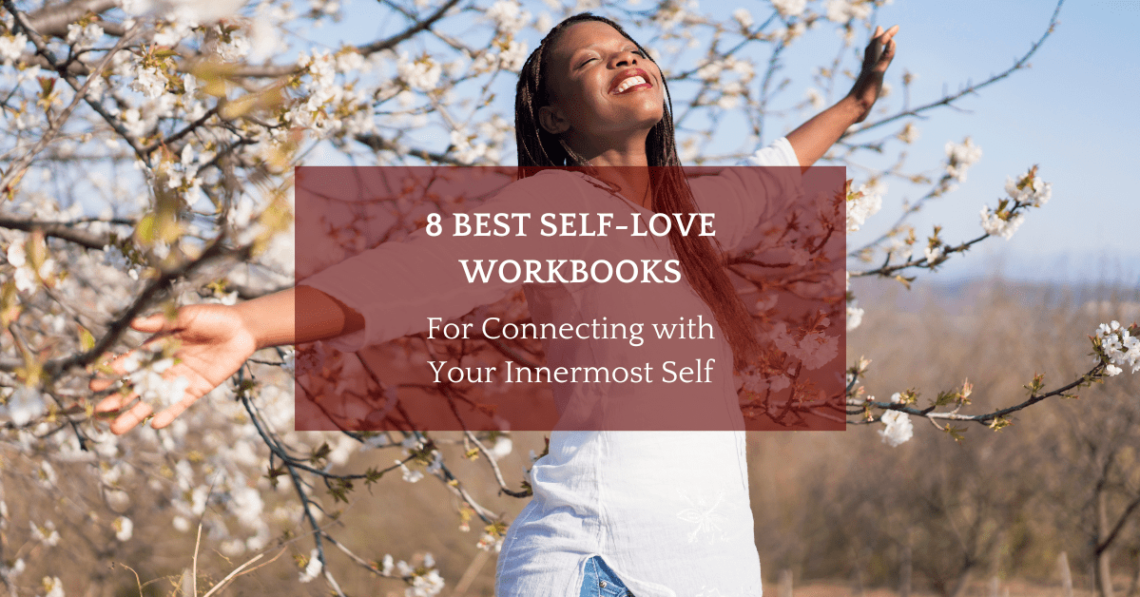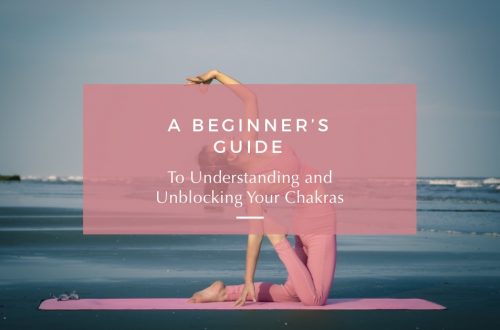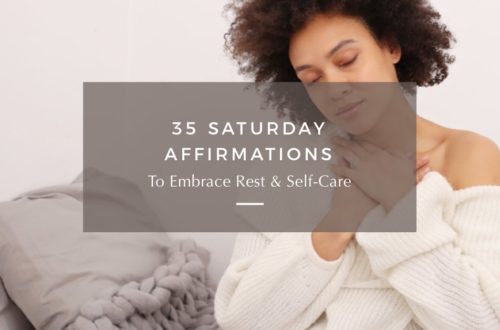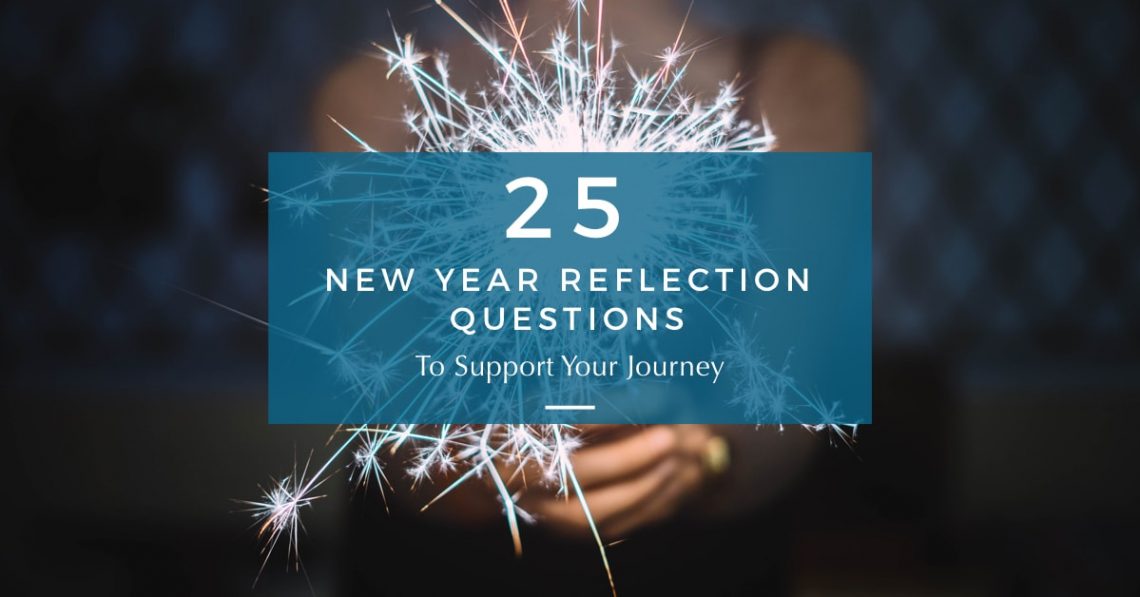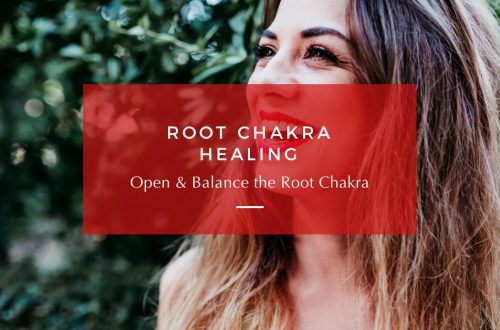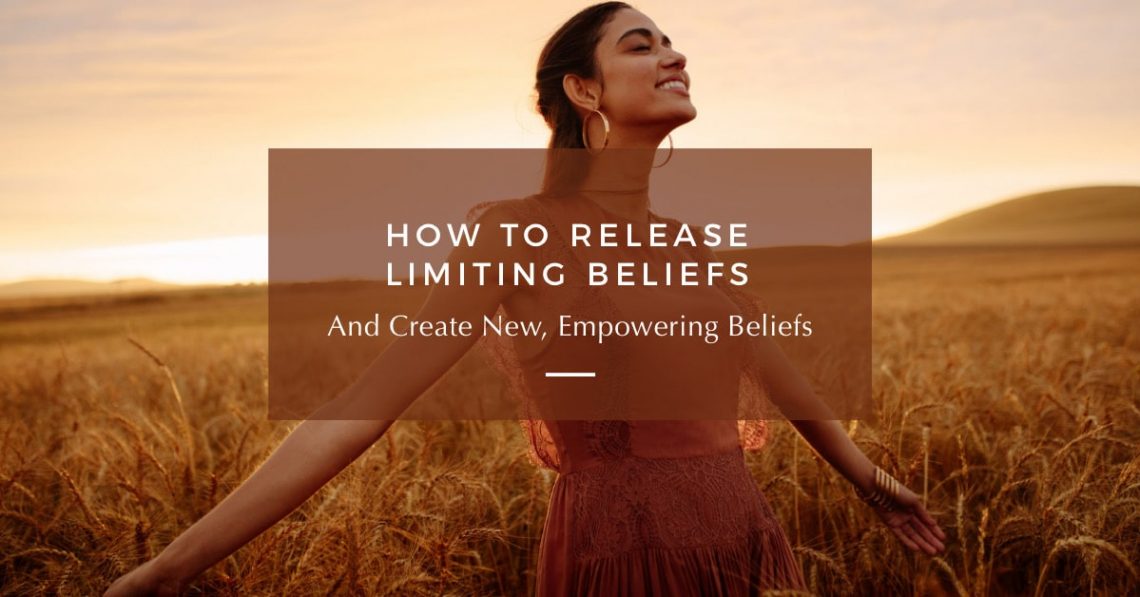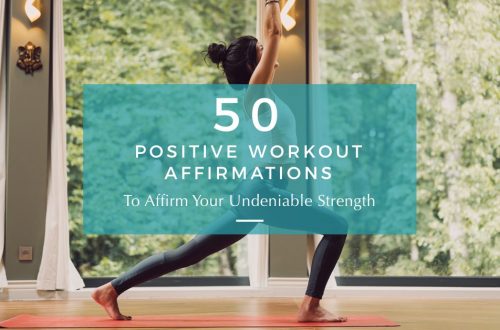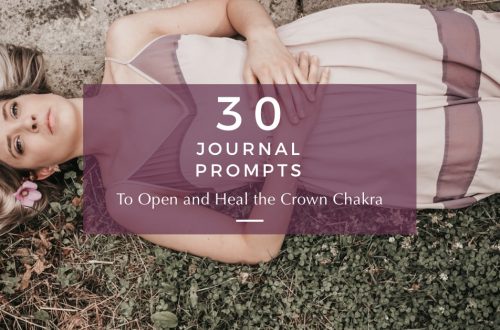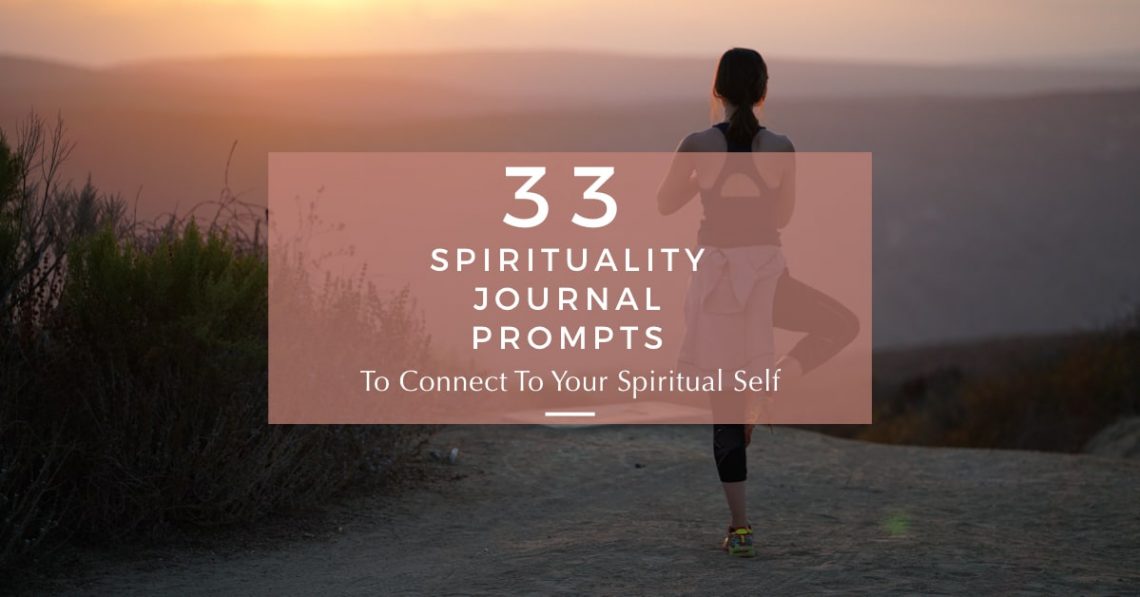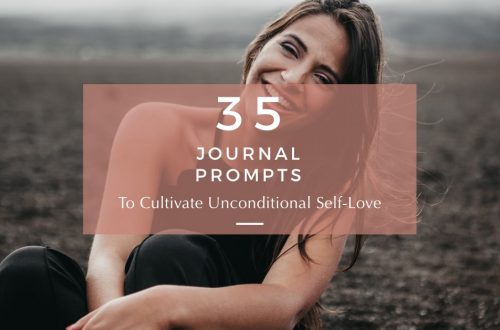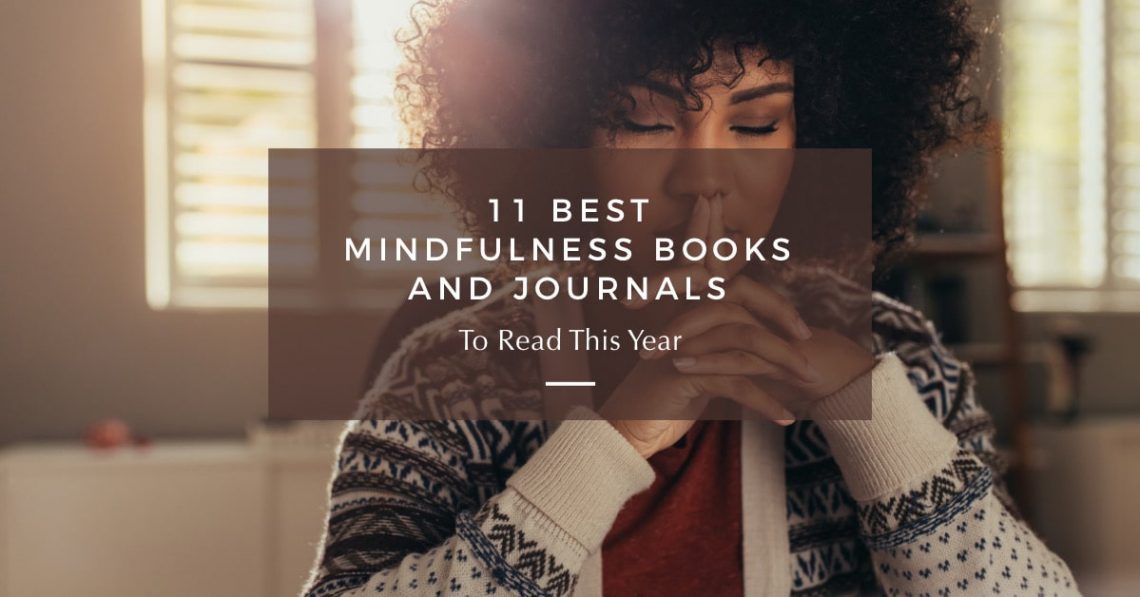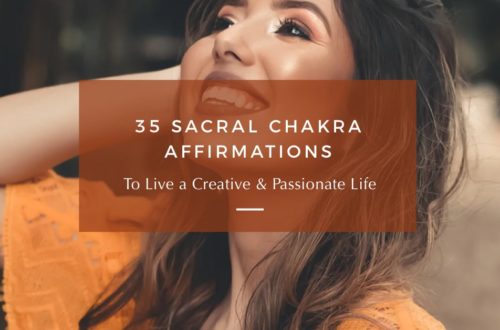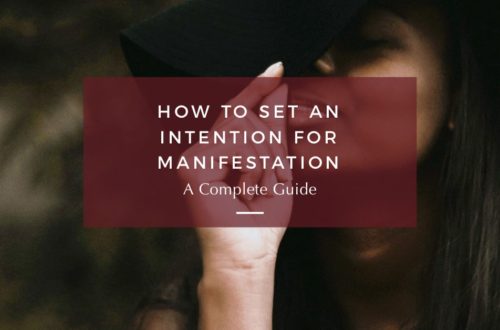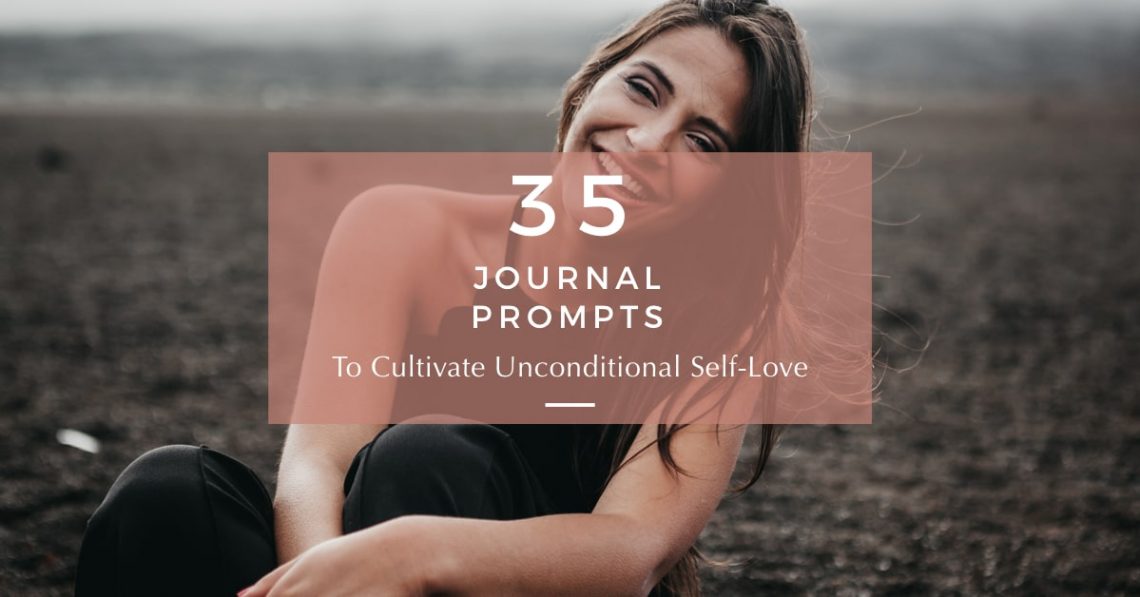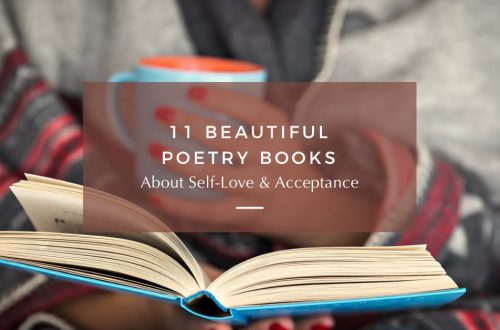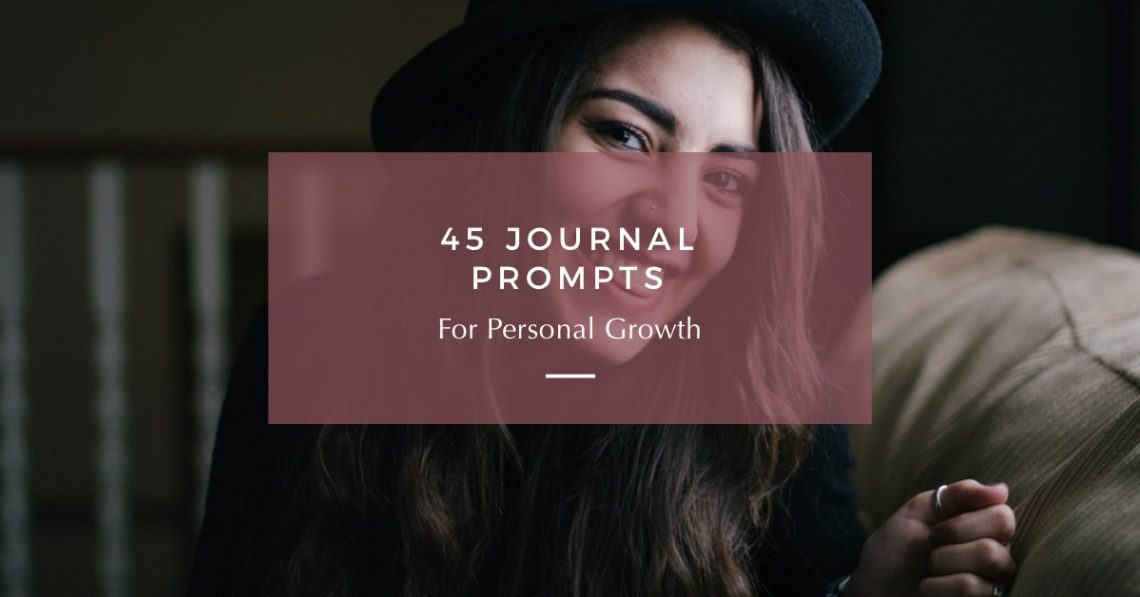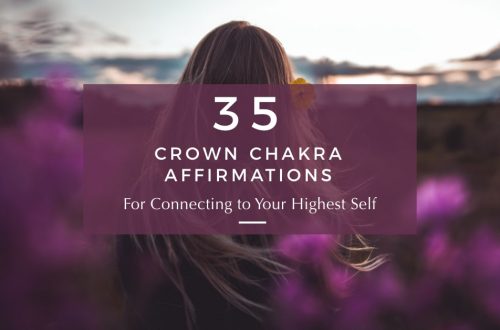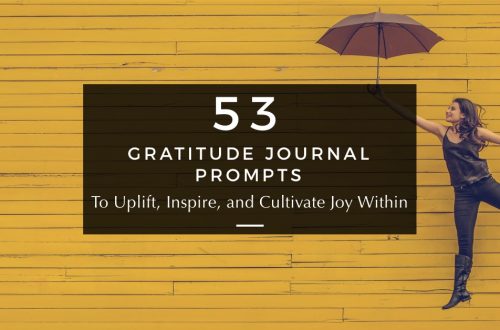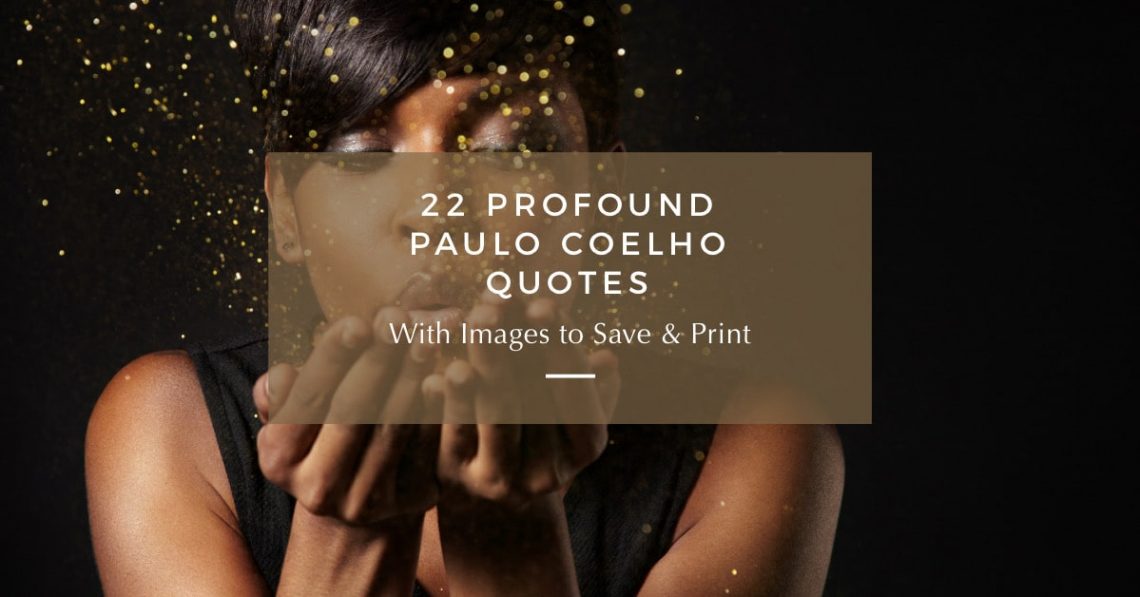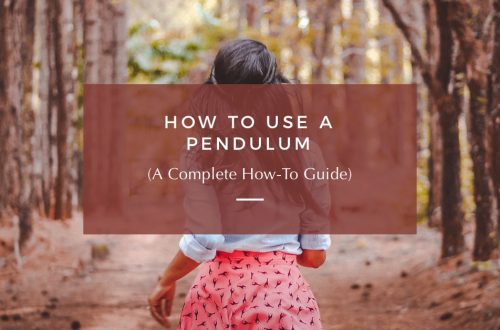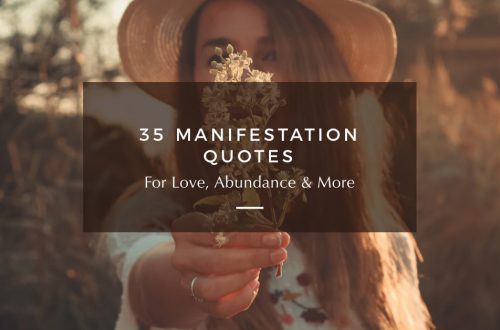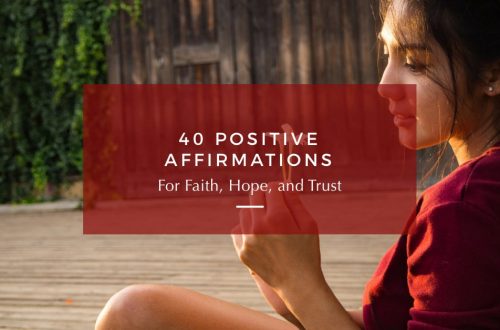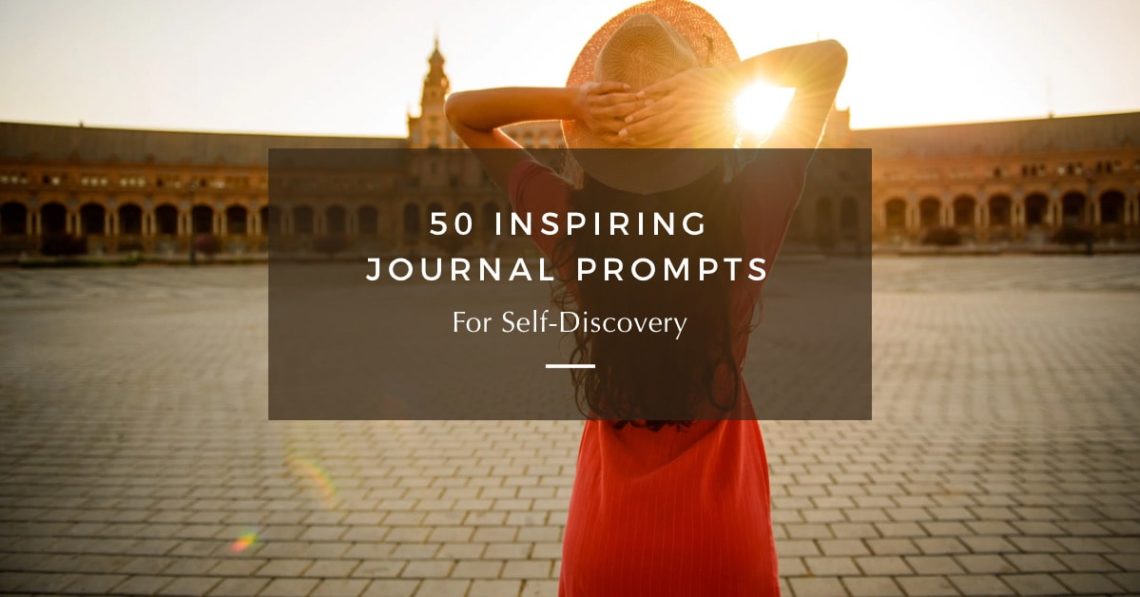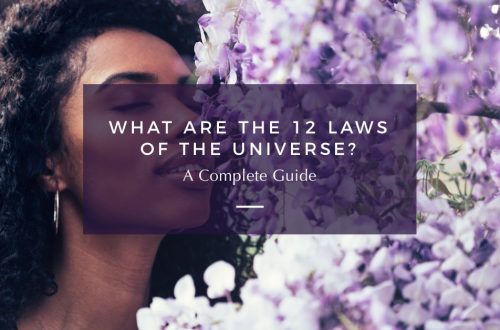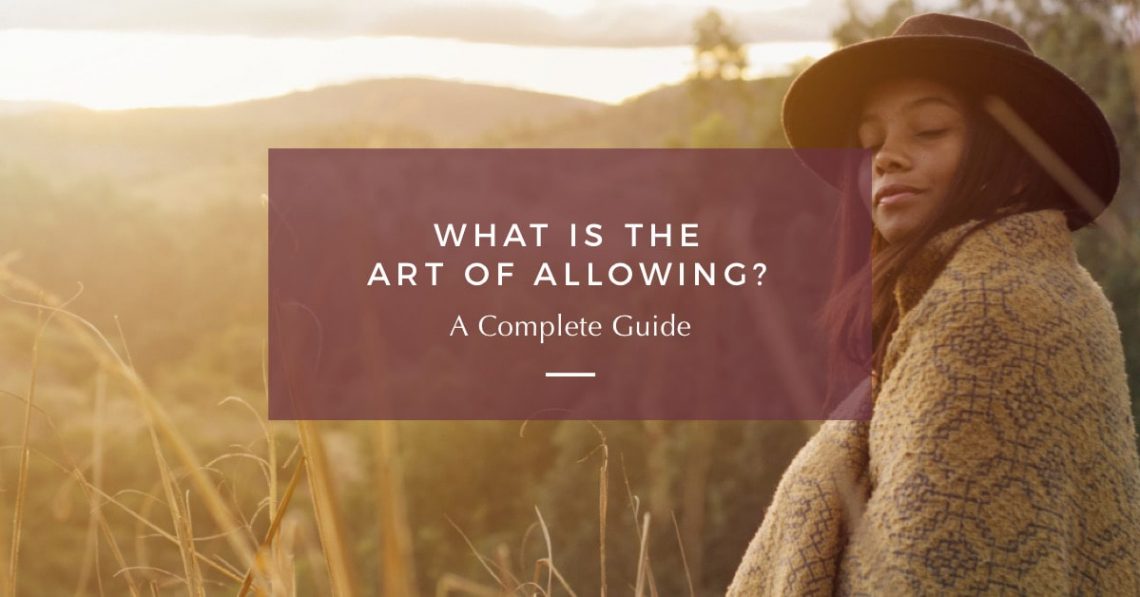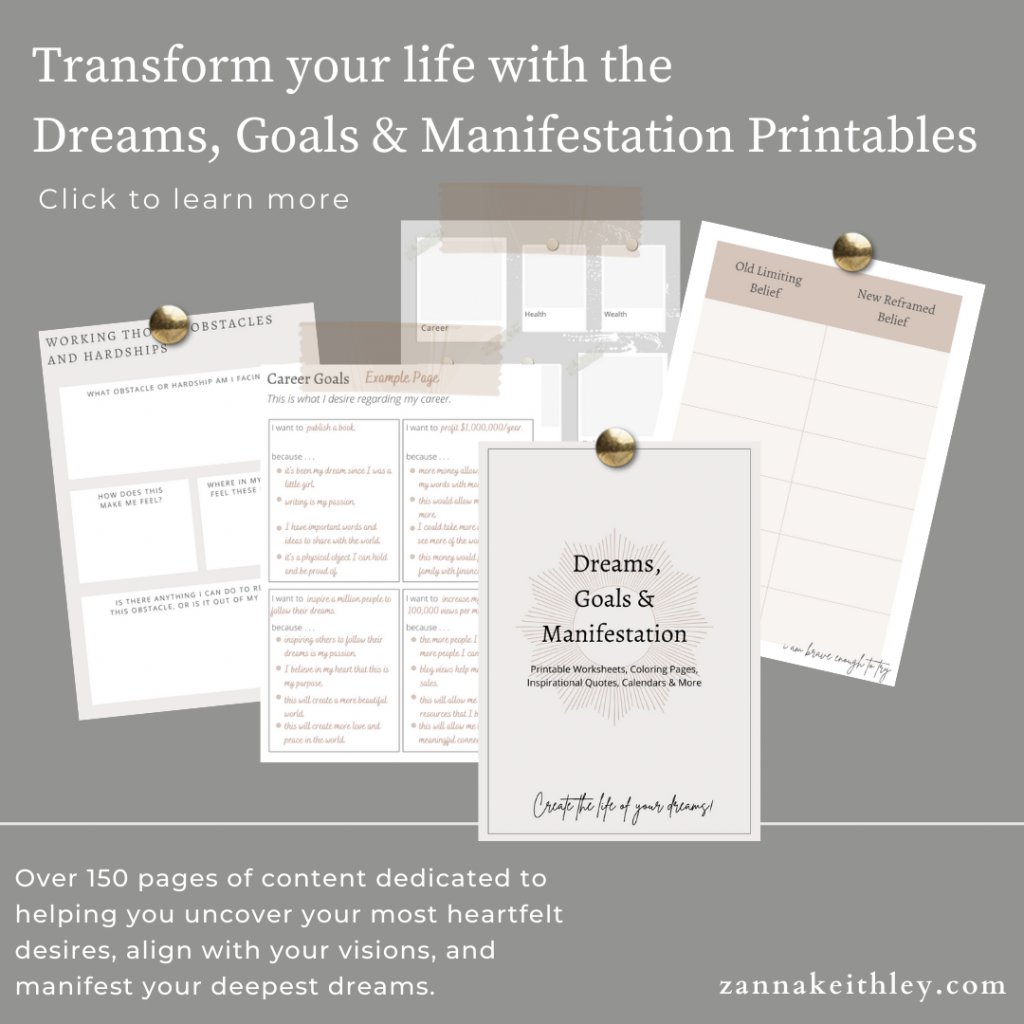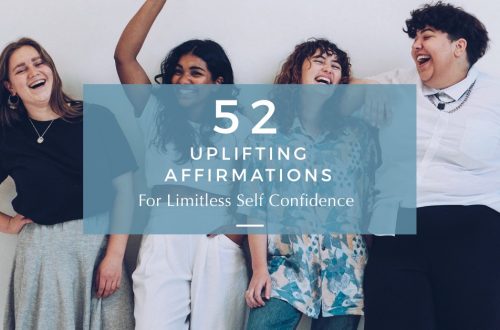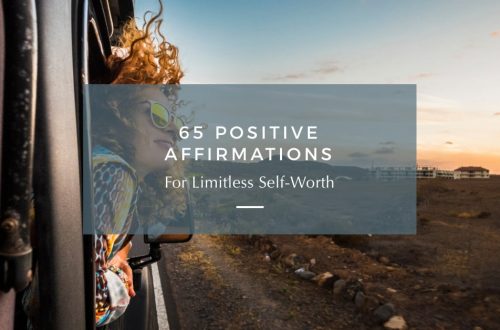-
8 Best Self-Love Workbooks (For 2024)
Below, discover eight of the best self-love workbooks for 2024 to help you connect with your innermost self and cultivate deep self-love and acceptance.
Disclaimer: This post contains Amazon links. As an Amazon associate, I earn from qualifying purchases. If you purchase a product using my link, I may receive a small commission at no extra cost to you. You can read my full disclosure policy here.
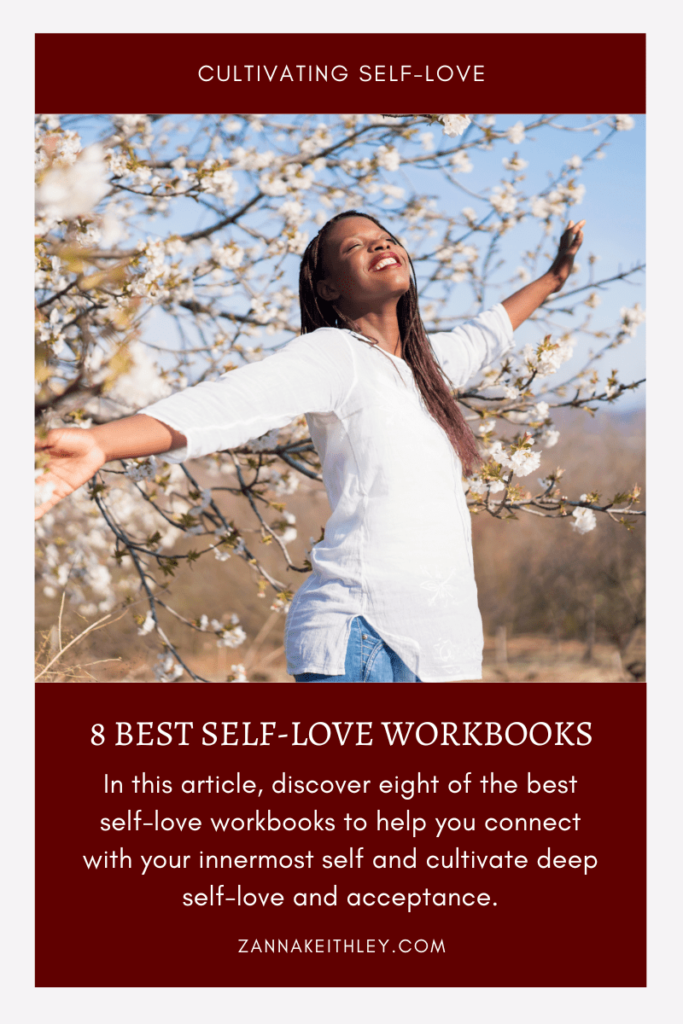
Pin this for later! 8 Best Self-Love Workbooks (For 2024) Your Self-Love Journey
Cultivating deep and profound self-love is a journey that never really has a beginning or an end.
And it certainly isn’t a linear path, either.
There may be days, weeks, even months when you feel really positive and accepting of yourself–when you know, undoubtedly, that you love yourself deeply. That you’re worthy, deserving, and more than enough. That there’s no one else you’d rather be.
And then, one day, something happens. Maybe someone says something negative that sticks with you. Or maybe it’s something you say to yourself. Maybe it’s just stress and anxiety creeping up on you.
Whatever it is, during these times, you may be a little harder on yourself. You might wish you could change certain aspects of yourself. You might have a hard time accepting who you are.
And I want you to know, it’s okay.
It’s okay to not always be your highest, best self. It’s okay to have days, weeks, even months when you struggle to work through the hard stuff.
What I hope is that through these times, you’ll remember this:
You are worthy of grace and self-compassion–both from others and especially from yourself.
One of my favorite practices when I’m going through a difficult time is journaling. For me, the simple act of writing something down allows me to get all that extra weight I’m carrying out of my body and onto the paper. And when I step away from my journal, I always feel a little lighter.
Workbooks are also another option that work just as well. I love workbooks because they always gently nudge me toward thoughts and emotions I didn’t even realize I was experiencing. They help me to view situations from a different perspective, and they give me the tools I need to aid my own self-discovery and personal growth.
Below, you’ll find eight of the best self-love workbooks to help you cultivate self-love, self-respect, and self-acceptance. All of these workbooks offer profound guidance, exercises, and reflection prompts to help you connect with your innermost self. And none of these workbooks are a one-time thing. Even after you’ve completed a workbook, you can continue to come back to it again and again to guide your journey.
- You May Also Like: 11 Beautiful Poetry Books About Self-Love & Acceptance
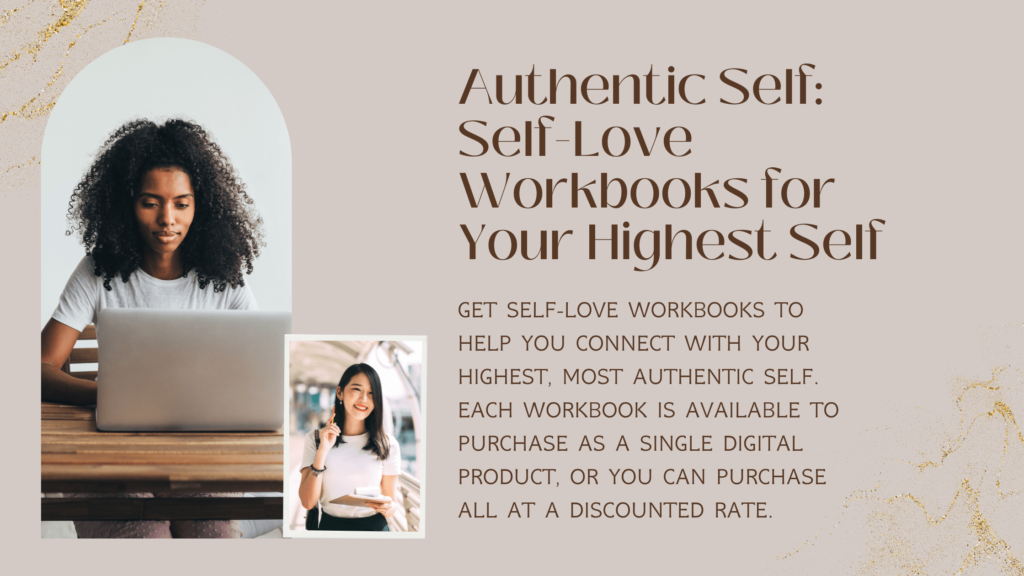
Looking for a digital workbook you can start using today? Check out the Authentic Self series! Best Self-Love Workbooks
Self-Love Workbook for Women
Megan Logan’s Self-Love Workbook for Women is everything you could possibly want in a complete, practical, and well-rounded workbook. It’s filled with exercises and activities to help you embrace your whole self, cultivate self-compassion, improve your self-esteem, and discover the true you. Additionally, it includes quotes, affirmations, and inspiring messages that will leave you feeling positive and empowered.
What I really love about this workbook is that it isn’t just a one-and-done thing. You can continue to come back to the pages in this workbook to create a wholehearted, empowered relationship with yourself for life.
The Self-Love Workbook
Dr. Shainna Ali’s The Self-Love Workbook is another empowering workbook that guides you through recognizing your inherent self-worth and cultivating a positive mindset. If you’re an avid journaler or someone willing to practice deep self-reflection, you’ll especially love this book. It’s filled with journaling prompts and reflection questions designed to deepen your relationship with your inner self. I also love that it’s organized into sections, including Self-Love, Self-Awareness, Self-Kindness, Self-Respect, and more.
This is a well-crafted, well-organized workbook that makes for a perfect gift to yourself or a loved one.
Confidence and Self-Love Workbook for Women
Roberta Sanders’ Confidence and Self-Love Workbook for Women is all about helping you embrace you. From building self-esteem and self-confidence to helping you navigate feelings of worry, overwhelm, and anxiety, this workbook is filled with empowering tools to guide you on a meaningful journey of self-discovery.
Note that what’s presented here isn’t a quick fix, but if you lean into the tools and guidance you’re given, you’ll take a worthwhile journey that will help you for your entire life.
Let That Sh*t Go
If you like a little humor thrown into your personal development journey, Monica Sweeney’s Let That Sh*t Go is the workbook for you. While technically marketed as a journal, it’s so much more than what you’d expect in a typical journal. It’s filled with meaningful messages tied in with a little cathartic profanity, practical activities, and even some coloring pages for those days when you just want to relax and let go.
The 5-Minute Self-Care Journal for Women
Judith Belmont’s The 5-Minute Self-Care Journal for Women is the perfect option for anyone who wants to work on their relationship with themselves but doesn’t have a ton of time for a long daily journaling routine. In this workbook, you’ll find 150 five-minute prompts, a short practice for you to do each day, and a daily affirmation–all of which are designed to help you connect to and embrace your whole self: mind, body, and soul.
The Gift of Self-Love
If I was to describe one workbook on this list as being “the one you didn’t know you needed,” it’s this one. Simply put, I adore Mary Jelkovsky’s The Gift of Self-Love workbook.
In addition to being filled with meaningful exercises designed to help you get in touch with your inner self and release the pressure to people please, it also holds a lot of truly heartfelt messages, personal stories, advice, and research. There’s no fluff here. The Gift of Self-Love is truly the gift that keeps on giving.
Mental Health Journal for Men
Dr. Ryan Howes’ Mental Health Journal for Men is filled with practical exercises, journal prompts, and opportunities for meaningful self-reflection. This workbook is powerful and free of fluffy words and activities. Here, you’ll find truly thoughtful and compassionate guidance to help men prioritize their mental health and total well-being. This workbook gives men permission to focus on themselves in a safe, judgment-free way.
The Self-Love Workbook for Teens
I included Dr. Shainna Ali’s The Self-Love Workbook above, but I also wanted to include The Self-Love Workbook for Teens, as this is a really great and profound option for the teenager in your life. It’s filled with interactive activities, reflective exercise, journaling prompts, and practical advice to help teens conquer self-doubt and develop a healthy mindset that will stick with them for life.
Do you have any favorite self-love workbooks or journals? Share your favorites in the comment box below!
And for more self-love resources, be sure to connect with me on Instagram, where I post daily affirmation stories every morning. And don’t forget to follow me on Pinterest, where I’m pinning positive affirmations and empowering quotes every single day.
More Articles For You
- 44 Spiritual Growth Quotes For Your Spiritual Journey
- 30 Profound Journal Prompts For Spiritual Growth
- 30 Journal Prompts For Self Growth (& Deeper Self-Love)
- 4 Undeniable Reasons Why You Are Not Broken
- 28 Inspiring Quotes For New Beginnings
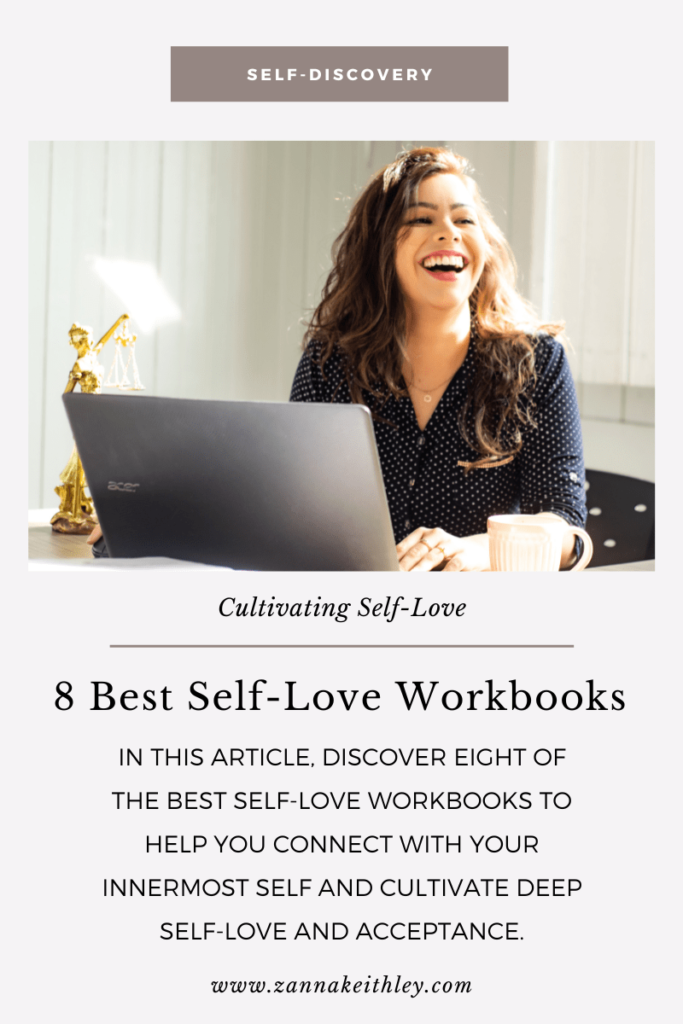
Pin this for later! 8 Best Self-Love Workbooks (For 2024) 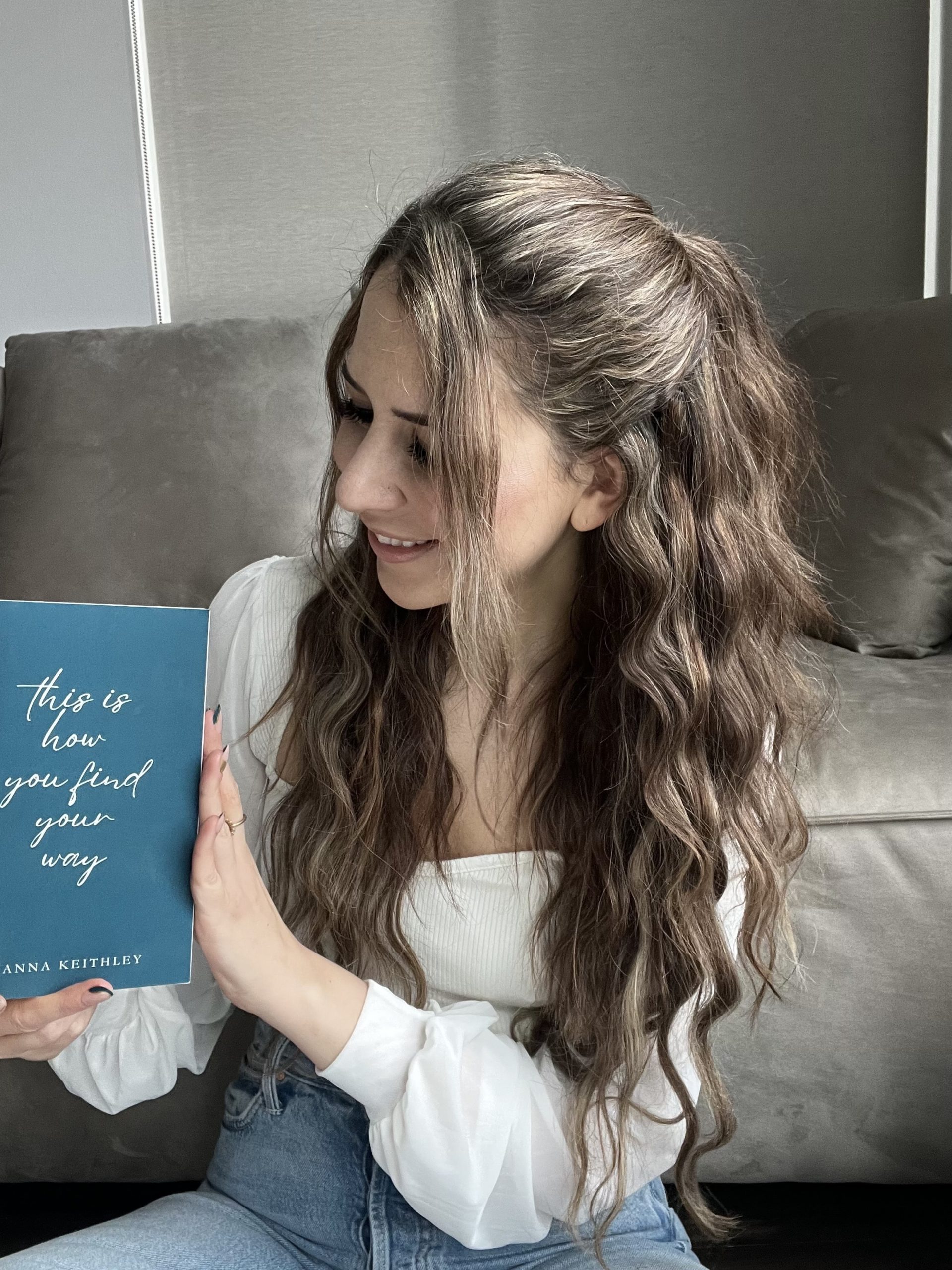
Zanna Keithley is an author, poet, and social media content creator who writes short prose dedicated to inspiring readers to follow their dreams, trust their intuition, and create beautiful and fulfilling lives. You can find her original writing on Instagram @zannakeithley.
-
25 New Year Reflection Questions to Support Your Life Journey
In this post, discover 25 empowering New Year reflection questions to help you reflect on the past year and set goals and intentions for the year to come.
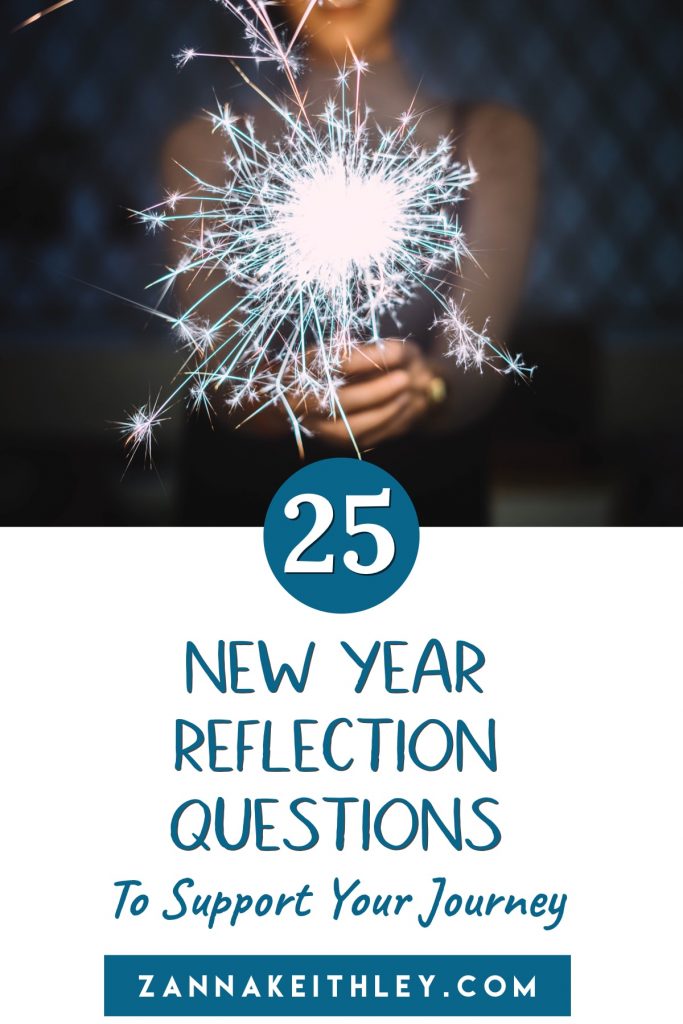
Pin this for later! 25 New Year Reflection Questions to Support Your Journey New Year’s Resolutions
“I don’t believe in New Year’s resolutions. They never work. Haven’t you heard that most people quit their resolutions by the end of January?”
Have you ever heard anyone say these words? Or maybe you’ve said them yourself. To be honest, I’m sure a version of my younger self once echoed these familiar words that I’d heard countless times before.
Now though, I’m not such a big fan of them.
Sure, maybe many people do quit their resolutions early on in the year.
But you?
You’re not everyone.
And what other people do with their own resolutions has absolutely nothing to do with you.
And furthermore – sometimes, letting go of a resolution you made weeks or months ago doesn’t automatically equal failure.
For instance, you might realize that your chosen resolution doesn’t actually support your highest good. This happened to me a couple years ago, when I decided for my resolution that I was going to run my second full marathon. At the time, it seemed like a worthwhile goal for the year ahead.
But as I started making training plans, I started to feel like my heart wasn’t truly in it.
I realized that the time I’d have to dedicate to running would take away from hiking, cycling, yoga, and the other physical activities I enjoyed. I had only set this resolution because it felt like something I should do.
But it didn’t actually align with what was in my heart.
So I let go of that resolution and instead chose the path that felt right to me at the time.
And I have zero regrets about that decision.
Another argument people often have against New Year’s resolutions is that we should be able to make resolutions any time of the year. And I one hundred percent agree with this statement.
But why can’t we do both?
I think it’s fair to let yourself make and change your resolutions throughout the year while also embracing the new year as a time for new beginnings.
Finally, it’s important to define what a New Year’s resolution really is. It doesn’t always have to be a quantifiable goal.
Here are some New Year’s resolutions that you can’t quantify, but they all support your overall well-being:
- To make more time for self-care
- To be more compassionate with yourself
- To make space for fun and play
- To embrace your limitless creativity
- To spend more time with the people you love
- To open yourself up to opportunities for more self-love.
So as you think about how you want to step into the new year, know that you don’t have to make some really big proclamation about all the monumental life changes you’re going to make. Sometimes, simply stating that you’re going to make more time for self-care or for creative activities is more than enough to support you on your life journey.
Below, you’ll find 25 new year reflection questions that will help you approach the new year with a vision for who you want to be and what you want to accomplish. The first ten questions are focused on reflecting on this past year, and the rest of the questions are all about setting goals and intentions for this upcoming year.
And remember, while this post is geared toward the new year, I’d definitely encourage you to come back to these questions as often as you want throughout the year to see how your answers change. (And know that if your resolutions do change, that’s okay – as long as they feel true and right to you.)
- You May Also Like: 35 New Year Affirmations For Hope & Possibilities
New Year Reflection Questions
- How have I grown in the past year? What led me to experiencing this type of growth?
- What positive changes have occurred in my life in the past year that I’m most grateful for?
- What are some obstacles and challenges I’ve experienced in the past year that I now feel grateful for, even if it was hard to appreciate at the time?
- What are some hardships I’ve experienced in the past year, and in what ways have these hardships helped me to grow?
- What risks have I taken that I’m glad I took?
- What beliefs do I hold now that I didn’t hold a year ago?
- What was one of my absolute favorite moments from this past year? What did I love most about this moment? (You can list multiple moments if you’d like.)
- What are 10 things about this past year that I feel truly grateful for?
- How would I describe myself right now? What do I love most about the person I am?
- How will I remember this past year? What lessons will I carry with me as I move forward in my journey?
- What would I do in this next year if I knew I could not fail?
- What’s still worth doing, even if I might fail?
- What limiting beliefs or fears are holding me back from pursuing my dreams? How can I release these beliefs and/or fears?
- What guiding principles, truths, and values will guide my journey over the next year?
- How can I cultivate more gratitude and appreciation in my daily life?
- What does self-care mean to me? What are some of my favorite self-care activities? How can I incorporate more self-care into my life over the next year?
- How can I make space for more fun, play, imagination, and creativity over the next year?
- When do I feel happiest? What brings me true joy? How can I allow more joy into my daily experience?
- What’s one thing I can do in five minutes a day to support my body, mind, and spirit?
- What does my ideal morning routine look like, and how can I build a morning routine that will set myself up for success?
- How can I be kinder and more compassionate to myself over the next year? When my inner bully comes out, what can I do to show myself more kindness and love?
- What do I need more of in my life? How can I make space for more of this in the next year?
- What do I need to release in my life? How can I let go of these things/experiences/people/beliefs to make space for something new?
- What’s something I’ve always dreamed of doing but haven’t done yet? Can I make this dream come true this year?
- What’s on my lifelong bucket list? Which of these things could I do or accomplish over the next year?
How are you reflecting on this past year and preparing to embrace the new year ahead? Share your favorite tips and practices in the comment box below.
And for more resources on spirituality, meditation, manifestation, and all things self-love, be sure to connect with me on Instagram and Pinterest, where I’m posting positive affirmations and empowering messages daily.
You May Also Like:
- How To Protect Your Energy (7 Essential Practices)
- 45 Personal Growth Journal Prompts To Be Your Best Self
- Vision Board Ideas To Visualize Your Ideal Future (With Examples)
- How To Raise Your Vibration In 30 Seconds (Or Less)
- 11 Beautiful Poetry Books About Self-Love & Acceptance
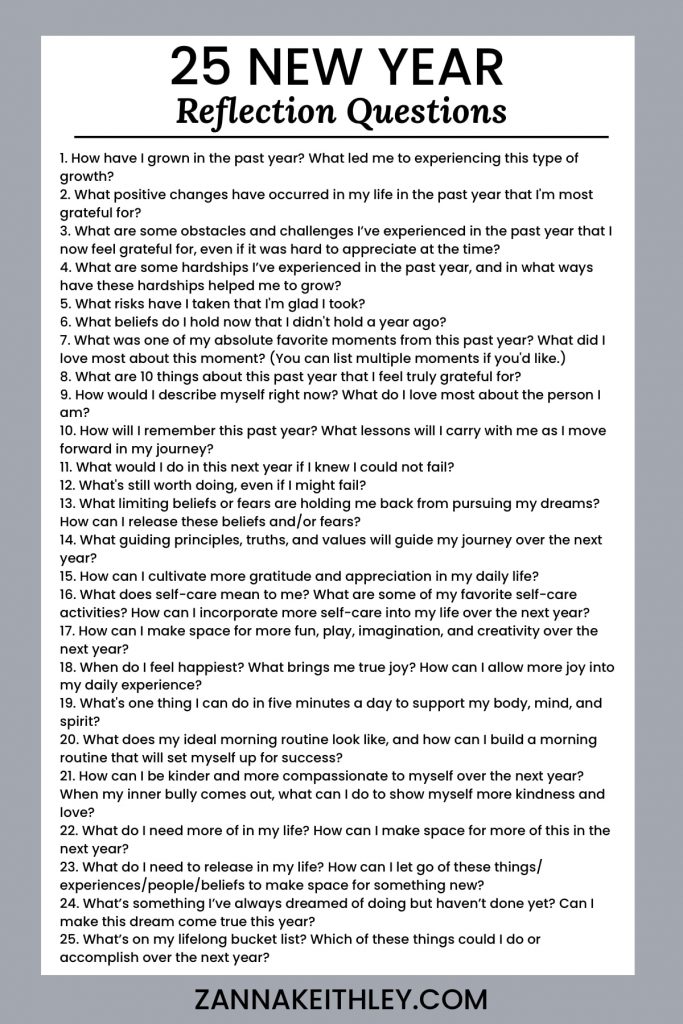
Pin this for later! 25 New Year Reflection Questions to Support Your Journey 
Zanna Keithley is an author, poet, and social media content creator who writes short prose dedicated to inspiring readers to follow their dreams, trust their intuition, and create beautiful and fulfilling lives. You can find her original writing on Instagram @zannakeithley.
-
How to Release Limiting Beliefs (and Create New Beliefs)
In this post, learn how to release limiting beliefs using several powerful practices. These practices will not only help you release your limiting beliefs, but they’ll allow you to make space to create new, empowering beliefs that will serve you as you step into a new chapter.
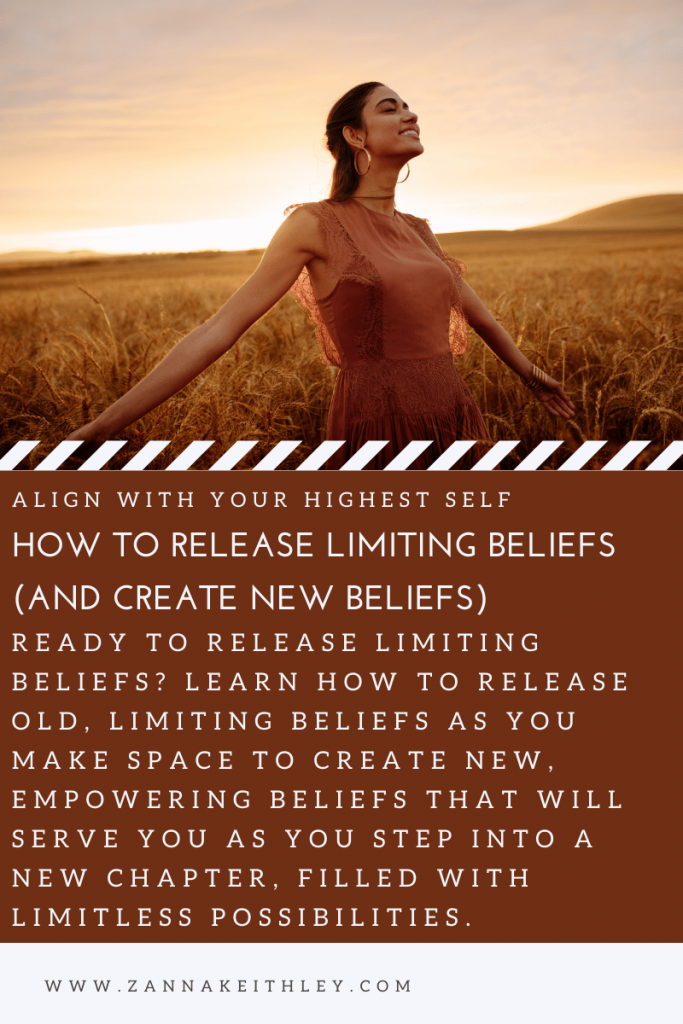
Pin this for later! How to Release Limiting Beliefs (and Create New Beliefs) What is a Limiting Belief?
A limiting belief is a deep-seated belief that holds you back from realizing your true potential and living your fullest, most authentic life.
Limiting beliefs can come in many forms. Here are a few examples:
- There are already thousands of wellness coaches out there. I don’t have anything special to offer to stand out from the crowd. I’ll never be able to compete.
- I’ll get back on the dating scene someday, but nobody’s going to love me the way I am now. First, I need to lose twenty pounds. My physical self has to be in peak shape to be loved.
- Only really lucky people get to have that kind of success. I’ll never make it.
Do any of these sound familiar? Or have you experienced similar types of thoughts that have held you back from taking the next step personally or professionally?
Most of the time, you’ll find that your limiting beliefs are rooted in fear: fear of rejection, fear of abandonment, fear of not being enough, fear of failure, and even fear of success.
But know this: you are not your fears.
And you have the power to rise above your limiting beliefs and fears. What held you back yesterday doesn’t have to continue to hold you back today.
Below, you’ll discover how to release limiting beliefs using several powerful practices. You can use one or two of these practices, or you can try them all and see how they feel for you.
Even more importantly, these practices don’t just help you release limiting beliefs; they allow you to create new, empowering beliefs that will guide you in your journey forward into a new, more freeing chapter.
Do you want to dig even deeper into your limiting beliefs and begin creating a new story for yourself today? Check out the Releasing Limiting Beliefs workbook, part of the Authentic Self: Self-Love Workbooks series. In this 42-page digital workbook, you’ll identify your limiting beliefs and do the deeper inner work of releasing them so you can create new, empowering beliefs to guide your self-love journey. Plus, get affirmations and journal prompts for deeper self-reflection. Learn more here!
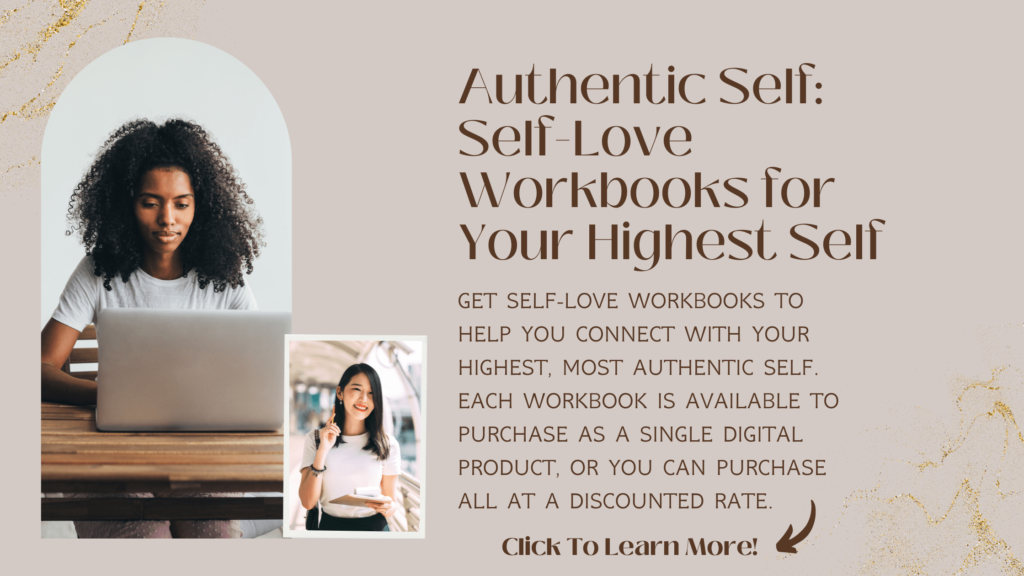
How to Release Limiting Beliefs (5 Methods)
Make a Reframed Beliefs List
One of my favorite ways to release limiting beliefs is to make a list of new, reframed beliefs.
To do this, you can use a sheet of paper or pull up a blank document on your computer. Make a table with two columns.
Title the first column, Old Limiting Beliefs. Title the second column, New Reframed Beliefs. You can also use the titles, Limiting Beliefs I’m Releasing and Empowering Beliefs I’m Embracing.
Under the Limiting Beliefs column, write down all of the limiting beliefs that have held you back. Maybe there’s just one or two really big ones, or there may be several you want to write down.
Now, what’s the opposite of those limiting beliefs you just wrote down?
In the next column, turn every limiting belief into a new, positive, empowering belief. Essentially, you’re writing a powerful affirmation here. If your belief is that you’re not good enough, affirm that you are good enough. Write what feels good and right to you.
Repeat these new reframed beliefs as often as you need to. You might decide to look at them every morning and recite your empowering beliefs aloud.
Here’s an example of how your list might look:
Old Limiting Beliefs New Reframed Beliefs I’m not talented enough to make it. Why even bother? I have what it takes to succeed and thrive. I’m more than enough. Nobody will want to date someone like me. I shouldn’t even try. I have so many amazing qualities to offer. There’s someone out there looking for exactly someone like me. Burn Your Limiting Beliefs List
Another practice that might feel cathartic for you is to take the limiting beliefs list you wrote above and burn it. Let this be a representation of you letting go of your limiting beliefs and making space for something new in your life.
If you do this, I recommend still finding a way to turn those limiting beliefs into empowering beliefs. After you burn your limiting beliefs, you can make a list of positive affirmations that represent your new beliefs. Instead of focusing on the negative energy of your old beliefs, focus on the fresh energy of your new beliefs. Let this new energy carry you forward into your next chapter.
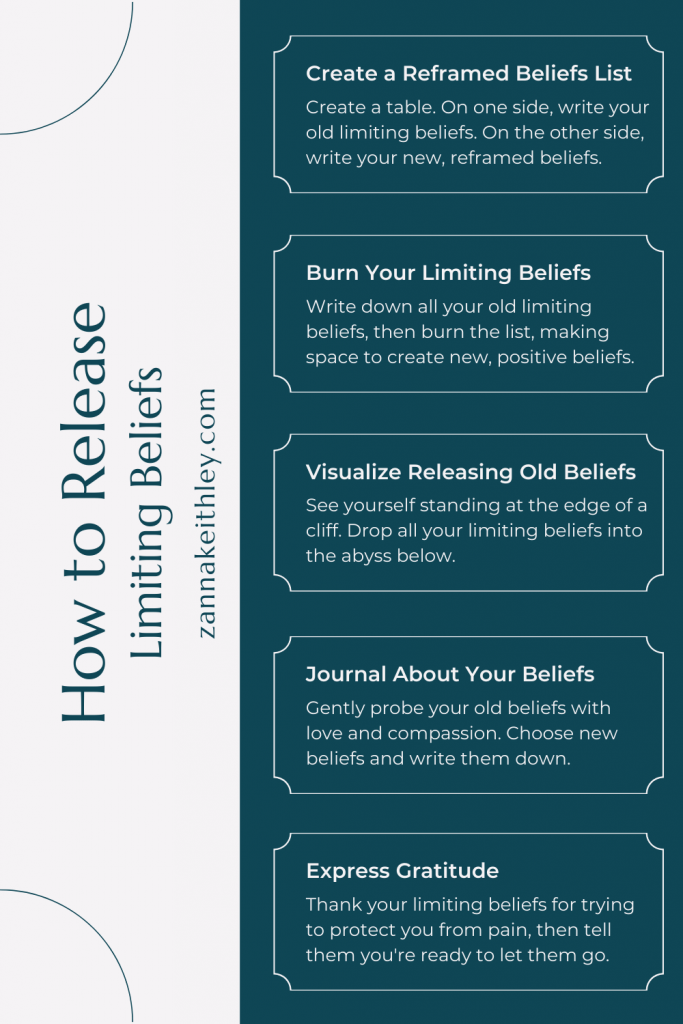
Visualize Releasing Your Limiting Beliefs
Another one of my favorite practices for releasing limiting beliefs is to envision myself throwing my limiting beliefs off a cliff and watching them disappear.
To do this, find a quiet, safe spot where you won’t be interrupted. Close your eyes. Imagine you’re standing at the edge of a cliff. Below is a deep chasm—you can’t see the bottom. Now, invite your limiting beliefs to come forward. See them with non-judgmental awareness.
This means you don’t criticize yourself for having these beliefs. You don’t place labels on these beliefs as bad or wrong. Simply see them, just as they are.
You might even send a little love to your limiting beliefs and acknowledge the ways in which they tried to serve you. For instance, you might say, “I recognize that you were trying to protect me from getting my heart broken, but I no longer need your service anymore.”
Next, release these old beliefs into the chasm below. Watch them until they disappear. Feel yourself getting lighter without the weight of these fears pressing down on you.
Now you have space to create new, positive beliefs. Create your new beliefs in love, kindness, and courage, knowing you have the strength to step into the life you were always meant to live.
Journal Your Feelings
Instead of making a list, it might help you to explore your limiting beliefs in journaling.
Journaling allows you the time and space to explore the limiting beliefs that have been holding you back. It also allows you to probe these beliefs and ask, “Is it true?”
For instance, you might discover that the belief that you’re not talented enough has been holding you back from pursuing your dreams. But once you start writing about it, you realize that you’ve just been using this fear to stay small.
And you also realize that it absolutely is not true.
You are talented enough. And you have what it takes to succeed—you just had to recognize it for yourself.
Explore your limiting beliefs with love and compassion through journaling. And in your writing, you can release these beliefs and create new beliefs that support your mind, body, and spirit.
Here’s a few questions to ask yourself as you journal:
- What’s stopping me from taking the next step to pursuing my dreams?
- What fears do I possess?
- What beliefs am I clinging onto?
- If these limiting beliefs didn’t exist, what would I do?
- Are these limiting beliefs actually true?
- What new, empowering beliefs am I creating today?
Express Gratitude for Your Limiting Beliefs
One way to overcome your limiting beliefs is to make them a little less intimidating. And you do this by recognizing that limiting beliefs aren’t 100% bad, scary things.
You possess these limiting beliefs for a reason. Most likely, they were protecting you from something. Take some time to explore how these limiting beliefs may have been trying to serve you. You can write this in a journal, create a list, or simply think about your answers.
Then, thank these limiting beliefs for the ways in which they served you. Afterwards, you can use any of the practices on this list to release them, or you can simply say, “I’m ready to release you now.”
Feel the space around you open up as you prepare to create new beliefs that are more in line with the life you want to live.
Next Steps
So you’ve released your limiting beliefs—what comes next?
In the beginning, you may fall back into old thought patterns that don’t reflect where you want to go with your life. When this happens, don’t judge or criticize yourself. Rather, react with love and a whole lot of self-compassion.
It helps to have positive affirmations on-hand that lift your vibration and help you to feel confident and empowered. Choose some of your favorite affirmations and save them to your phone (or print them out). Repeat them daily. To help you get started, I’ve linked to some of my favorite positive affirmations below.
If you find yourself falling back into old, limiting beliefs, you can repeat any of the practices on this list. Remember that it took you years to cultivate these beliefs, so it will take time to release them fully. And that’s okay—in time, you’ll find that your old beliefs are slipping further and further away from your mindset, until you no longer fall back to them anymore.
For even deeper healing as you let go of your limiting beliefs and embrace new, empowering beliefs, be sure to check out the Releasing Limiting Beliefs workbook. Begin writing your new story today.
And for positive affirmations, self-love tools, manifesting tips, and spiritual resources, be sure to follow me on Pinterest and Instagram.
More Articles You May Like
- How To Protect Your Energy (7 Essential Practices)
- 45 Personal Growth Journal Prompts To Be Your Best Self
- Vision Board Ideas To Visualize Your Ideal Future (With Examples)
- How To Raise Your Vibration In 30 Seconds (Or Less)
- 11 Beautiful Poetry Books About Self-Love & Acceptance
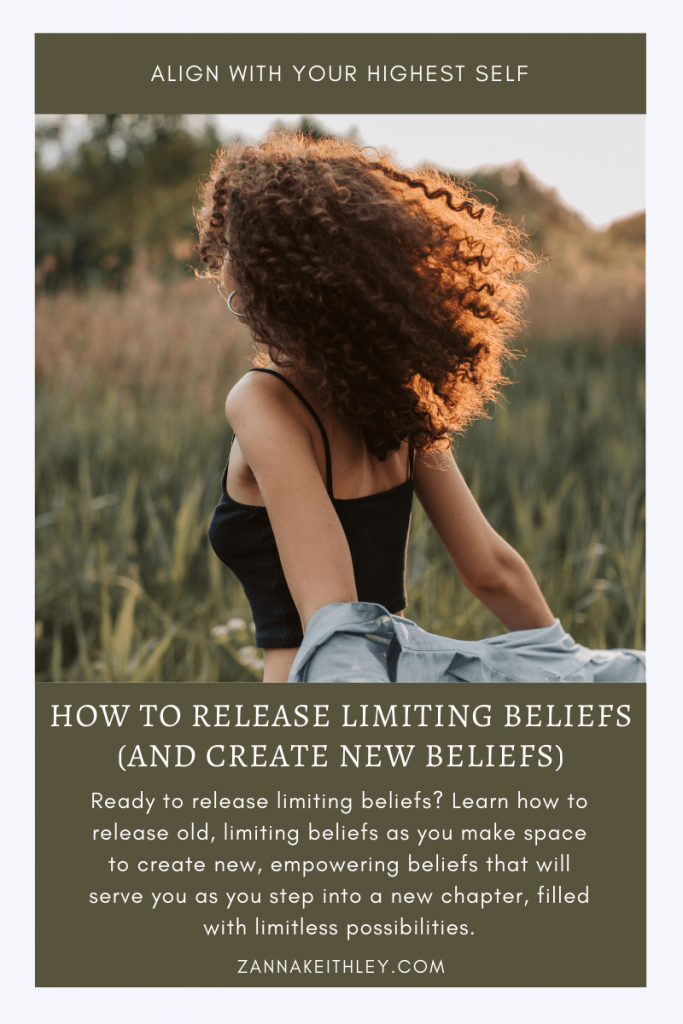
Pin this for later! How to Release Limiting Beliefs (and Create New Beliefs) 
Zanna Keithley is an author, poet, and social media content creator who writes short prose dedicated to inspiring readers to follow their dreams, trust their intuition, and create beautiful and fulfilling lives. You can find her original writing on Instagram @zannakeithley.
-
33 Spirituality Journal Prompts to Connect to Your Spirit
Below, discover 33 spirituality journal prompts to gently guide you within and help you to connect to your innermost self.
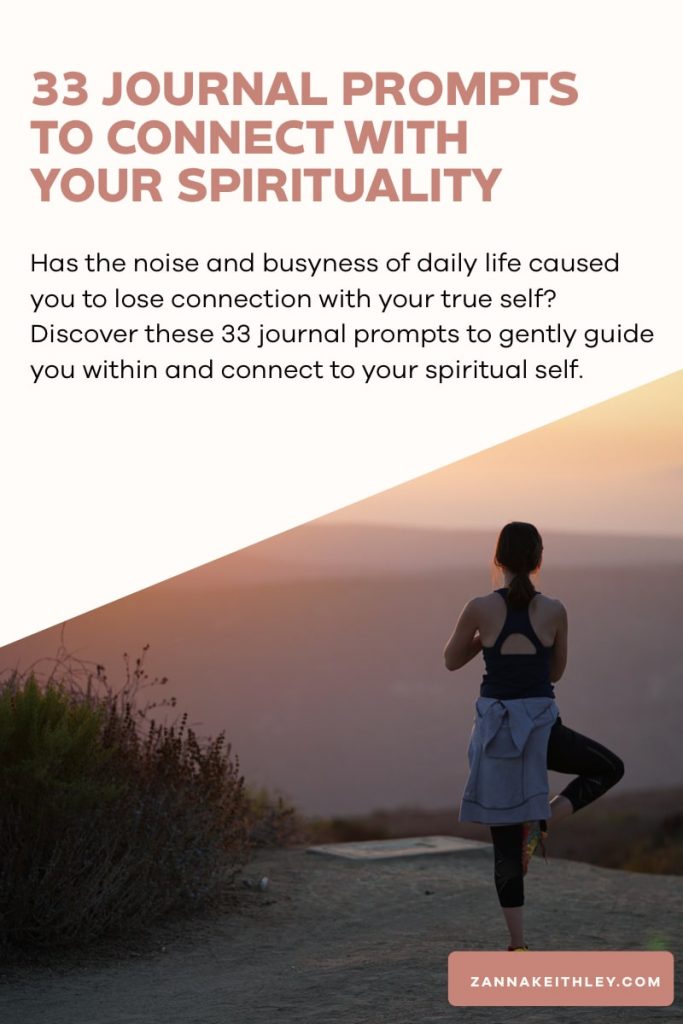
Pin this for later! 33 Spirituality Journal Prompts to Connect With Your Spiritual Self Spirituality
Click here to skip straight to the journal prompts.
Who is your spiritual self?
Do you connect with your spiritual self in the silence of meditation or in the company of others? Do you feel most spiritually aligned at a religious temple, or does your spiritual self speak to you when you’re in the mountains or near the ocean?
What does spirituality mean to you? How does it show up in your daily life? How does it guide your actions and beliefs?
All of these questions could be journal prompts themselves, and there are no right or wrong answers.
Throughout your life, you’ll find people whose spiritual beliefs align with yours, and you’ll find others who have very different beliefs. You’ll also cross paths with people who are in different stages of their spiritual journeys. Some are only just beginning to connect with their own spirituality, while others have been on this journey for a long time.
No two spiritual journeys look exactly the same. How you connect with your spiritual self is deeply personal to you.
Often, we may lose our spiritual selves amidst the noise of daily life. We get lost in the busyness of to-do lists and external obligations. We work. We run errands. We take care of our responsibilities.
And as a result, we may feel like something’s missing. Something we can’t quite pinpoint. Something that goes beyond explanation.
That something is your connection with your innermost self. In the midst of all the external noise, we forget to connect with our own spirits. We lose touch of our true purpose. We forget what it feels like to simply surrender and trust.
The 33 spirituality journal prompts below are meant to gently guide you within and help you to connect to your true self. There are no rules for how to answer these journal prompts, but I do urge you not to judge or criticize yourself. At all times, show yourself deep compassion and love. If possible, try to give yourself some time alone to focus on your journaling without distractions.
And remember that you are always worthy and deserving of unconditional love. You’re worthy of receiving love from yourself. You’re worthy of receiving love from other people. And you’re worthy of receiving love from a higher power.
Even if you’ve lost touch with your true self, you still possess infinite worthiness within you.
I hope these spirituality journal prompts support your total well-being and serve your mind, body, and spirit.

Spirituality Journal Prompts
- How would I describe my relationship with a higher power?
- Who or what is God to me? How would I describe this higher power?
- In what ways does the Universe speak to me?
- How do I speak to the Universe? Do I feel like I’m heard?
- Write about a time in which you experienced the Universe’s unconditional love.
- Do I feel like the higher power in my life judges me or loves me without condition? How does this higher power feel about me?
- Are there any spiritual practices I’m feeling called to learn more about? (For example, tarot, pendulum dowsing, or astrology.) What will I do to take that first step toward learning more about this practice?
- Have I connected with my spirit guides? If so, who are they? If not, what feelings and beliefs do I have about spirit guides?
- Who is my highest self? How do I align with my highest self in my daily life?
- How does my highest self approach each day? How does my highest self react to negative energy? How does my highest self walk through life?
- Do I regularly consult with my highest self when responding to situations and making decisions? If not, how can I begin to include my highest self in my life’s journey?
- What is my soul’s purpose? Do I feel connected to my purpose? If not, what steps can I take to discover my soul’s purpose?
- Do I believe I’m a spiritual being in a human body? What does this concept mean to me?
- What blessings am I experiencing in my life right now?
- What signs and synchronicities have appeared in my life that have guided my path?
- When and/or where do I feel most connected to my spiritual self?
- Do I feel safe openly expressing my spirituality? Why or why not?
- When I’m aligned with my spiritual self, how do I feel?
- What is a time in my life when my prayers weren’t answered (or it seemed as though they weren’t answered), and this actually worked out positively for me?
- What are some examples of past experiences when the Universe gave me exactly what I needed at exactly the right time?
- What does it mean to me to surrender to a higher power? Is this easy or hard for me?
- What are three ways I can practice surrendering in my daily life?
- In what ways is my spiritual journey a solo journey, and in what ways does it connect me more with others?
- What does it mean to me to be connected to all living beings (people, animals, plants, the earth, and the universe as a whole)?
- Do I trust my path or do I have a hard time releasing control? What makes this hard or easy for me?
- What about my spiritual self am I still learning and discovering?
- Did I have any childhood experiences that negatively affected my belief, attitude, or relationship toward God, the Universe, and/or the concept of spirituality? Have I been able to heal from these experiences, or is there still healing to be done?
- What self-care practices can I do for myself to nourish my spiritual self? How can I take care of my mind, body, and spirit?
- What is the relationship between my soul and my body?
- How can I tell when my spiritual self has been neglected? What can I do for myself in these moments?
- What evidence do I see in my life of the Universe always looking out for me? What are some visible and non-visible signs of the Universe’s love?
- How does God (the Universe/Source Energy/the Divine) show up in my daily life?
- Why am I always worthy of the Universe’s infinite love?
For positive affirmations, self-love tools, manifesting tips, and spiritual resources, be sure to follow me on Pinterest and Instagram.
More Articles For You
- 33 Profound Spiritual Healing Quotes To Guide Your Path
- How To Receive Messages From The Universe
- How To Tap Into Your Intuition (A Complete Guide)
- How the Law of Rhythm Influences Your Daily Life
- 30 Journal Prompts For Self Growth (& Deeper Self-Love)
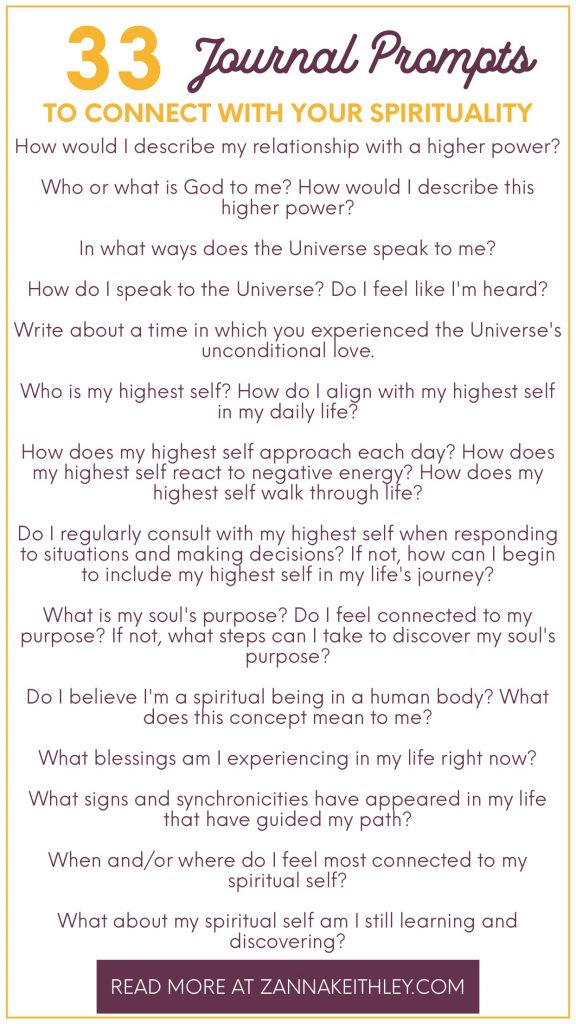
Pin this for later! 33 Spirituality Journal Prompts to Connect With Your Spiritual Self 
Zanna Keithley is an author, poet, and social media content creator who writes short prose dedicated to inspiring readers to follow their dreams, trust their intuition, and create beautiful and fulfilling lives. You can find her original writing on Instagram @zannakeithley.
-
11 Best Mindfulness Books & Journals (for 2024)
In this post, discover 11 of the best mindfulness books and journals to read this year. For beginners and experienced mindfulness practitioners alike, these resources will take you on a profound journey to cultivating mindfulness and inner peace.
Disclaimer: This post contains Amazon links. As an Amazon associate, I earn from qualifying purchases. If you purchase a product using my link, I may receive a small commission at no extra cost to you. You can read my full disclosure policy here.
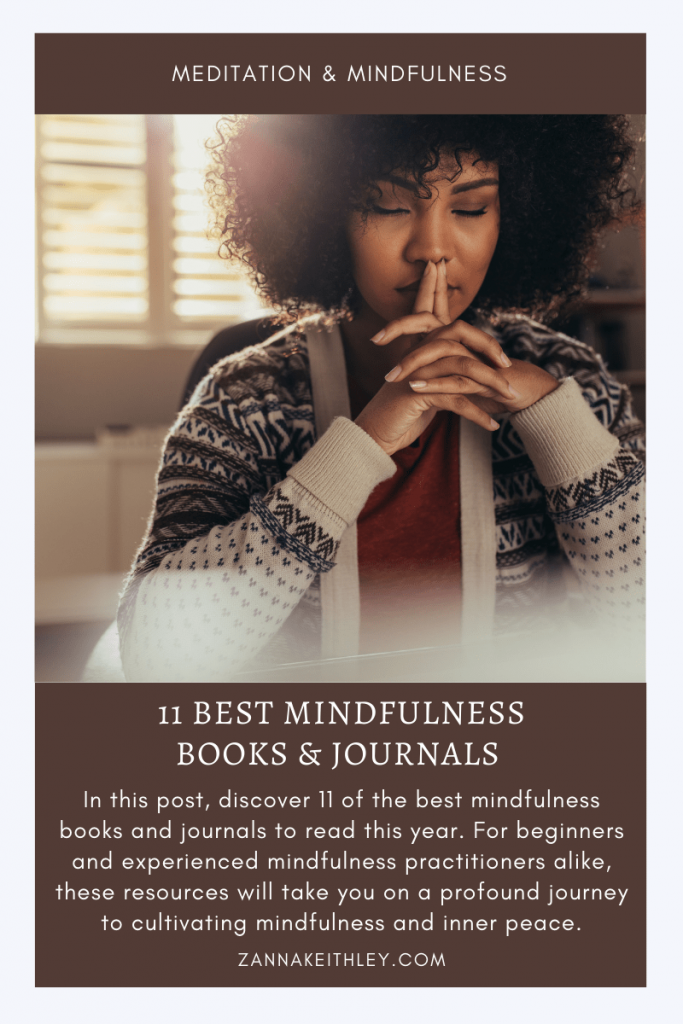
Pin this for later! 11 Best Mindfulness Books & Journals (for 2023) What Is Mindfulness?
Mindfulness is non-judgmental, conscious awareness in the present moment. This means being aware of your own thoughts, feelings, and surroundings in the present moment without putting labels on any of it as right or wrong. Mindfulness is sometimes referred to as the art of noticing, as it doesn’t require anything from you except to simply notice.
Now, if this is still kind of unclear, that’s okay. Let’s break it down a little further.
- Lack of Judgment: As humans, we experience a range of thoughts and emotions throughout our lives. Sometimes, we experience this spectrum in a single day. Anger, fear, sadness, pain, anxiety, and stress are emotions we often call negative. Likewise, we may have thoughts that we deem to be wrong or bad. The key to mindfulness is to not judge ourselves for our thoughts and emotions. Simply observe. If you notice that a thought you’re having doesn’t align with what feels good and true to you, you can take this moment to realign with your truth.
- Conscious Awareness: This means that you recognize your thoughts, words, and actions as you’re thinking, speaking, and acting. This is the opposite of the “autopilot” mode we all fall into once in a while. Conscious awareness is taking a step back, recognizing the autopilot mode, and choosing how to think and feel in this moment. (Again, when you catch yourself in autopilot mode, don’t judge yourself. It’s perfectly normal.)
- Returning to the Present Moment: I think about the past a lot. I also think about the future a lot. And that’s okay. I can also recognize that the only real thing in the world is this moment right now. You can think about the past and future, but don’t live there. Live in this moment. That’s what mindfulness does for us; it allows us to honor and recognize the beauty, value, and importance of this moment right now.
Mindfulness is knowing that nothing about this moment is wrong. Nothing is a mistake. It is exactly as it is. And if you don’t like how you’re feeling or what you’re experiencing in this moment, notice and see if you can realign with something that feels better. But don’t judge yourself for being human.
If you’d like to learn more about what mindfulness is and explore profound mindfulness quotes from top scholars and thinkers, you can learn more about mindfulness here. And in this post, I offer 10 practices to help you cultivate mindfulness today.
Below, you’ll find 11 of the best mindfulness books and journals for beginners and experienced mindfulness practitioners alike. All of the books and journals below will take you on a gentle, profound journey that leads you to the greatest destination of all: back to yourself.
- You May Also Like: 10 Best Manifestation Books to Read This Year
Mindfulness Books & Journals
Practicing Mindfulness: 75 Essential Meditations
If you’re looking to begin your own mindfulness practice, Matthew Sockolov’s Practicing Mindfulness: 75 Essential Meditations will take you on a truly profound and meaningful journey through mindfulness using meditation. Here, you’ll find 75 unique exercises. The early ones can be done in just 5 minutes a day, and as you progress in your journey, so will the meditations. This is a great guide for both beginners and experienced practitioners alike.
Think Like A Monk
Jay Shetty’s Think Like A Monk is an inspiring guide to overcoming your own negative thoughts, accessing your inner peace, and clearing any roadblocks that may be stopping you from tapping into your own power and potential. Shetty takes often complex and abstract ideas and transforms them into accessible exercises and advice that you can use in your own life to reduce stress and increase mindfulness.
Mindfulness: An Eight-Week Plan
Mindfulness: An Eight-Week Plan for Finding Peace in a Frantic World by Mark Williams and Danny Penman provides you with simple yet powerful practices for cultivating mindfulness in your daily life. It promotes true joy and inner peace and helps you to break the cycle of daily stress, anxiety, and exhaustion.
Wherever You Go, There You Are
When you start researching mindfulness, Jon Kabat-Zinn is likely one of the first names that will come up. (And likely, his name will keep appearing over and over again). This book is absolutely a must-have for those new to meditation and mindfulness as well as seasoned practitioners. Wherever You Go, There You Are takes you on a profound journey back home to yourself. It teaches you how to cultivate mindfulness your own way in a gentle yet powerful manner.
Mindfulness For Beginners
And because there can never be too much Jon Kabat-Zinn on a mindfulness list, his book Mindfulness for Beginners: Reclaiming the Present Moment and Your Life is a truly wonderful resource for anyone just starting their mindfulness journey. This book guides you back to yourself and helps you to embody the real and true you. This book is an invitation to transform the way you think, feel, work, and play in a loving, wholehearted manner.
A Year Of Zen
Bonnie Myotai Treace’s A Year of Zen is a 52-week guided journal filled will thought-provoking journal prompts and ample space to explore and reflect upon your own experiences and inner world. (And its simple illustrations are elegant and serene.)
Mindfulness For Beginners In 10 Minutes A Day
Lara Hocheiser’s Mindfulness for Beginners in 10 Minutes a Day is another great resource for those just beginning their mindfulness journey. Hocheiser provides the readers with an explanation of what mindfulness is in an easy-to-grasp way and offers simple yet profound exercises for practicing mindfulness every morning, day, and night.
The Miracle Of Mindfulness
Thich Nhat Hanh is another prominent figure in the meditation and mindfulness space. His book, The Miracle of Mindfulness, is a beautiful and gentle introduction to mindfulness, offering exercises and anecdotes that remind you that each moment holds its own gifts and opportunities for peace.
The Mindfulness Journal
Worthy Stokes’ The Mindfulness Journal: Creative Prompts to Relax, Release, and Explore the Wisdom of You is a wonderful discovery filled with gifts on every page. In addition to prompts, it offers exercises that allow you to explore mindfulness through connecting with your inner artist. This is a beautiful journal that also makes a great gift for friends and loved ones.
Star Wars: The Jedi Mind
Star Wars: The Jedi Mind: Secrets from the Force for Balance and Peace by author Amy Ratcliffe and illustrator Christina Chung pairs lessons from Star Wars with mindfulness lessons relevant to our own galaxy in the 21st century. This is a perfect gift to yourself or the Star Wars fan in your life, offering accessible lessons focused on peace, serenity, and balance.
A Year Of Mindfulness
Jennifer Raye’s A Year of Mindfulness is a 52-week mindfulness journal that includes weekly themes and daily writing prompts that allow you to cultivate mindfulness each day of the year. The simple, easy-to-follow exercises in this journal are designed to help you live in the moment and notice the world around you (and within).
Do you have any favorite mindfulness books or journals? Share your favorites in the comment box below! And for positive affirmations, self-love tools, manifestation inspiration, and spiritual resources, be sure to follow me on Pinterest and Instagram.
Looking for more? Here are a few more posts you might like:
- How To Tap Into Your Intuition (A Complete Guide)
- 500 Things To Be Grateful For Today
- Alternate Nostril Breathing: Benefits & How-To Guide
- 33 Profound Spiritual Healing Quotes To Guide Your Path
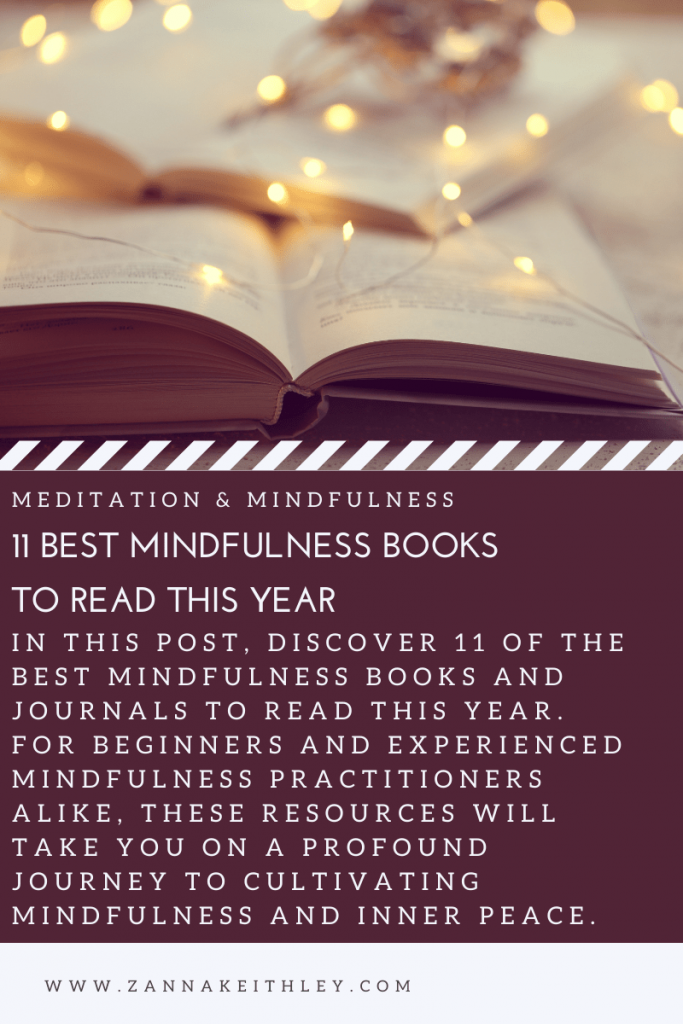
Pin this for later! 11 Best Mindfulness Books & Journals (for 2023) 
Zanna Keithley is an author, poet, and social media content creator who writes short prose dedicated to inspiring readers to follow their dreams, trust their intuition, and create beautiful and fulfilling lives. You can find her original writing on Instagram @zannakeithley.
-
35 Journal Prompts For Unconditional Self-Love
Are you ready to create a deeper, more loving relationship with your innermost self? Below, you’ll find 35 self-love journal prompts designed to help you cultivate unconditional love for your whole being: mind, body, and soul.
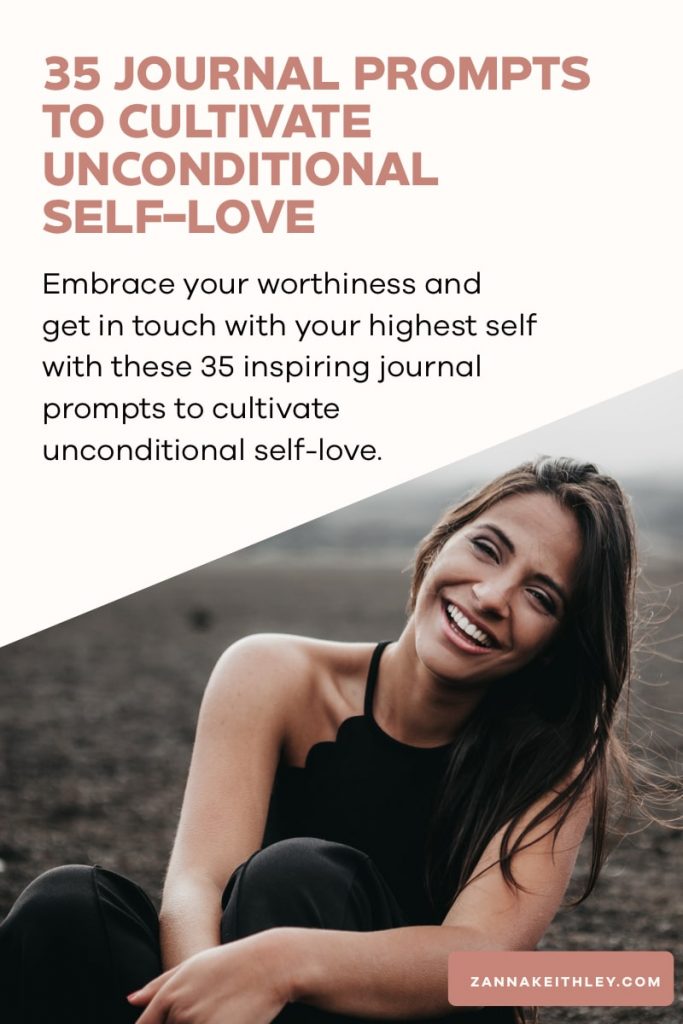
Pin this for later! 35 Journal Prompts to Cultivate Unconditional Self-Love Cultivating Unconditional Self-Love
You are worthy of unconditional self-love.
And you deserve to be loved every single day of your life.
Is that hard to say? It used to be for me. I had a hard time believing I “deserved” anything good in this world. I remember the first time I tried to say the affirmation, “I deserve joy.” Almost immediately, my inner bully heard these words and stampeded right out to speak her mind:
“Who are you to say that you deserve joy? How selfish can you be? What have you done to deserve anything?”
For most of my life, I’ve let that voice dictate my thoughts and actions. But one day, instead of immediately taking my inner bully’s words as truth, I paused and decided to reframe my perspective.
I believe my best friend deserves infinite joy and love, right? Absolutely.
And my nieces and nephews? Always.
What about my neighbors, community members, and strangers I see on afternoon walks? Well, sure. I don’t know them, but I believe they deserve joy, too.
It’s just me, I realized.
The only person I was being unfairly hard on was myself.
With this newfound perspective, my attitude started to shift. I began to incorporate positive affirmations into my daily routine and slowly started to speak more lovingly to myself.
And that question my inner bully had asked before?
“What have you done to deserve anything?”
Well, nothing. And everything. You see, I realized that I don’t actually have to do anything to deserve love, joy, peace, abundance, and all the good stuff in my life.
I was already deserving, just because I existed.
And the same is true for you.
Your very existence makes you worthy of unconditional self-love. You don’t have to do anything. You don’t have to prove anything. You don’t have to achieve anything.
You are worthy.
You are deserving.
And you are more than enough—just because you’re you.
Always.

How to Use These Journal Prompts
The journal prompts below are designed to help you love, celebrate, and honor everything that makes you uniquely you. These journal prompts are all about you: what makes you special, how you can fall in love with yourself a little more each day, and what self-care practices you can incorporate into your life to cultivate even more unconditional love within.
There are no rules for how to approach these prompts. If you want, you can answer them one at a time, or you can skip around and find the ones that resonate most with you.
If possible, try to schedule 15 to 30 minutes for your journaling time. Find a quiet spot where you won’t be distracted, and set the intention to be open and honest with yourself.
Most importantly, release all judgment as you start to write. If an uncomfortable feeling arises, choose to have compassion for yourself.
Remember this:
Self-love isn’t about cultivating perfection. Self-love is about loving your imperfections perfectly.
Self-Love Journal Prompts
- What are ten things I love most about myself?
- What superpower do I have that makes a positive difference in other people’s lives?
- What makes me a great friend?
- How can I show myself unconditional love in my daily life?
- What positive habits can I practice every day to show myself more love and self-acceptance?
- What self-care practices can I incorporate into my daily life to take care of my mind, body, and soul?
- What powerful affirmations can I repeat to myself to foster deeper feelings of unconditional self-love? How can I include these affirmations in my daily routine?
- When my inner bully comes out and speaks down to me, what can I do to show myself kindness and compassion?
- Do I possess any fears or limiting beliefs preventing me from showing myself and accepting unconditional love? How can I begin to release these fears and limiting beliefs?
- What is one moment in my life when I felt proud of myself? Describe this moment in detail, including all of the feelings you experienced.
- Am I able to easily express love to myself?
- How do I express love to myself? What are my favorite ways to show myself love?
- How have I grown in the past year? What led me to experiencing this type of growth?
- How have I grown in the past ten years? What positive changes am I most grateful for?
- When do I feel happiest? What brings me true joy? How can I invite more joy into my daily life?
- Who is one person who loves me unconditionally? Why am I deserving of this person’s love?
- What special talents do I have that make me unique?
- Why do people love to be around me? What positive characteristics do I possess that make me a joy to be around?
- What limiting beliefs do I need to release in order to cultivate more unconditional self-love?
- What five-minute practices can I incorporate into my routine that will nourish my mind, body, and spirit?
- If my family and friends were to describe me, what positive things would they say?
- What’s one thing I can do every morning to support myself before I start my day?
- What hardships have I experienced that have made me stronger? How did I show courage, strength, and resilience while experiencing these hardships?
- What’s a compliment I’ve been given multiple times? How does this compliment make me feel?
- Why is my unique perspective valuable and needed in this world?
- How do I inspire others?
- What are ten things about my body that I truly love and feel grateful for?
- Who is the highest, truest, most authentic version of myself?
- Why am I grateful for my past self?
- What can I do today that my future self will be grateful for?
- Why would I not want to be anyone else in the world but me?
- What’s one of the greatest things I’ve ever done?
- How do I exemplify greatness in my daily life?
- What parts of myself do I want to explore deeper? Why are these parts of me worthy of exploring?
- What’s my favorite thing about being me?
For more resources on spirituality, meditation, manifestation, and all things self-love, be sure to connect with me on Instagram and Pinterest, where I’m posting positive affirmations and empowering messages daily.
More Articles You May Like
- 50 Inspiring Journal Prompts for Self-Discovery
- Vision Board Ideas To Visualize Your Ideal Future (With Examples)
- 8 Powerful Guided Meditations For Manifesting Your Dreams
- How To Protect Your Energy (7 Essential Practices)
- 10 New Moon Rituals For Manifestation & Self-Love
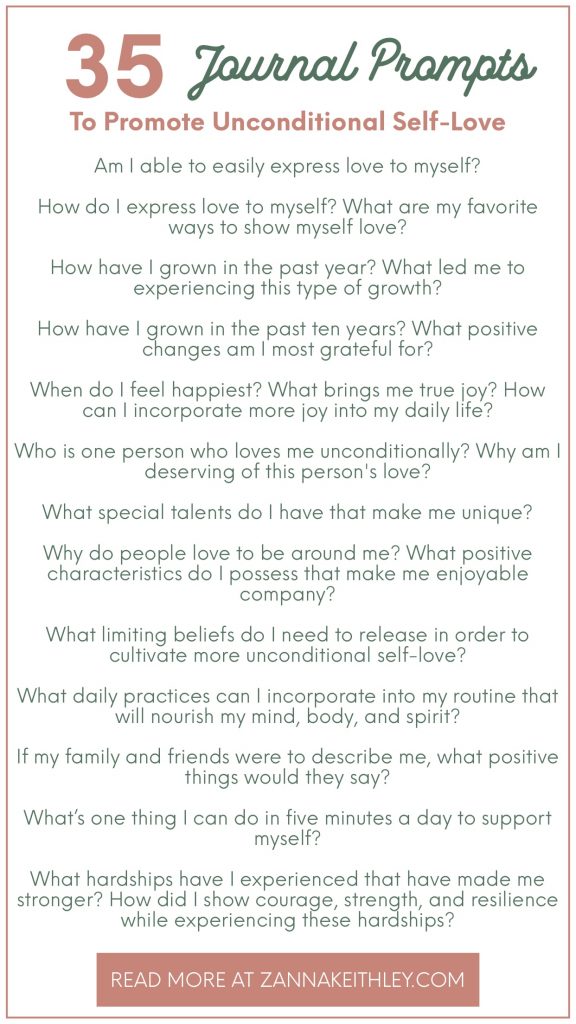
Pin this for later! 35 Journal Prompts to Cultivate Unconditional Self-Love 
Zanna Keithley is an author, poet, and social media content creator who writes short prose dedicated to inspiring readers to follow their dreams, trust their intuition, and create beautiful and fulfilling lives. You can find her original writing on Instagram @zannakeithley.
-
45 Personal Growth Journal Prompts To Be Your Best Self
In this article, discover 45 personal growth journal prompts to connect with your innermost self and cultivate a deeper connection with the truest, most authentic you.
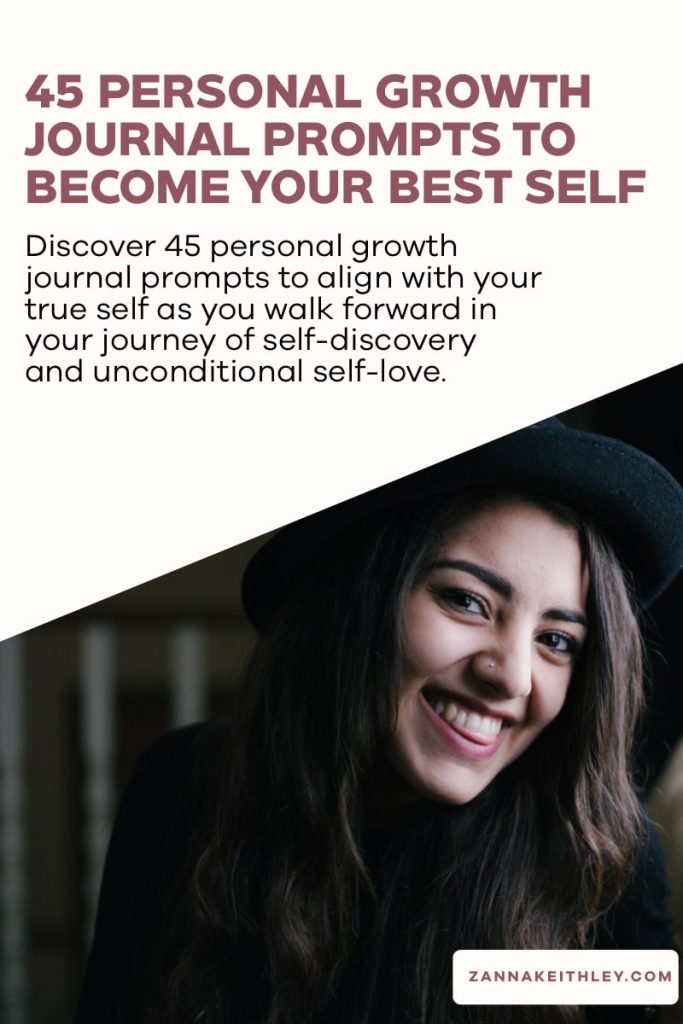
Pin this for later! 45 Personal Growth Journal Prompts to Become Your Best Self Your Journey to Your True Self
Who is your truest, most authentic self? When you close your eyes and try to picture yourself, who do you see? What qualities would you use to describe yourself? How have past experiences shaped you into the person you are today?
These are just some of the questions you can begin to ask yourself as you walk forward on your personal growth journey.
But first, what exactly does that mean? “Your personal growth journey.”
Personal growth entails getting in touch with your innermost self and looking into who you truly are: beyond appearances, beyond what’s expected of you, beyond even what you expect of yourself.
When you get past labels and preconceived notions, who is your authentic self?
It also requires you to ask important questions and respond with complete honesty. What does your heart really want? What limiting beliefs are preventing you from going after your dreams? What’s holding you back from living the life that was truly meant for you?
And as you ask these questions of yourself, you must then go beyond just asking. You must do.
What self-care practices will help you to align with your best self? Start those today.
What positive habits will serve and support your mind, body, and spirit? Start adding them into your daily routine this month.
What does your soul need? Let it in.
Below, you’ll find 45 personal growth journal prompts to support you in your journey. As you go through these questions, you might find that some take up pages of writing, while others can be answered quickly. There’s no right or wrong amount of time or space to use for these questions. Just keep digging for the truth.
And that’s the key, really: truth. Authenticity. Being honest with yourself.
Don’t simply tell yourself what you want to hear; tell yourself what you need to hear. But do so with love and compassion. If you find yourself judging or criticizing yourself for your answers, step back and gently assert that criticism has no place here.
Know that you are always, always worthy of kindness and compassion, even when you’re writing about your own perceived imperfections or mistakes you’ve made in the past.
Know that all experiences have supported your growth and have led you to where you are right now.
I hope these personal growth journal prompts support you in your journey and help you to align with the person you were always meant to be: the real and true you.
- You May Also Like: 50 Inspiring Journal Prompts For Self-Discovery
Personal Growth Journal Prompts
- Who is my truest, most authentic self?
- In what ways am I aligned with my most authentic self in my daily life?
- What causes me to become misaligned with my most authentic self?
- What simple daily practices can I do to align with my truest self?
- How have I grown in the past year?
- How have I grown in the past five years?
- What hardships have I experienced that have served my growth?
- Where do I see myself in one year?
- Where do I see myself in five years?
- What weaknesses do I perceive in myself? In what ways could these perceived weaknesses actually be strengths?
- What makes me feel the happiest? How can I incorporate this joy in my daily life?
- What would I say to the person I was ten years ago?
- What would I say to the person I will be ten years from now?
- Am I able to ask for help and lean on others? Can I trust others?
- Am I resourceful and able to count on myself? Can I trust myself?
- Do I consider myself intuitive? Do I trust my intuition when making decisions?
- How much do I use my logic and reason versus how much do I rely on my intuition and heart? Do I believe one is more important than the other? What’s my ideal balance between these sides of me?
- When I’m feeling overwhelmed, what practices can I do for myself to feel centered, grounded, and stable?
- What does my soul need in this moment, and how can I give myself what I need?
- What limiting beliefs do I possess that keep me from going after my dreams?
- How can I begin to release these limiting beliefs? Is it worth it for me to try to release them?
- What does success mean to me?
- If I could do anything with my life, what would it be?
- What holds me back from living the life I imagine?
- How can I cultivate more self-confidence and self-belief?
- What positive habits do I currently practice in my daily life?
- What positive habits do I want to add to my daily routine? How can I start adding these habits throughout the next month?
- Are there any emotions I tend to avoid feeling? Why do I avoid feeling these emotions? What would happen if I allow myself to feel these emotions more often?
- Am I still holding onto any negative energy from past experiences?
- How can I begin to gently work through any negative energy I’m holding onto?
- When I’m working on a project, do I get easily distracted? If so, how can I limit distractions that hinder my productivity?
- What does anxiety feel like physically, mentally, and emotionally for me?
- In what types of situations do I often experience anxiety?
- What practices help me to alleviate anxiety? When I’m experiencing anxiety, what do my mind, body, and spirit need the most?
- What’s the best compliment I’ve ever been given? Why is this compliment so special to me?
- What compliment do I wish someone would give me? Can I give this compliment to myself, right now?
- Am I holding onto any grudges from past experiences? What’s stopping me from releasing these grudges?
- What does forgiveness mean to me? Am I able to forgive easily?
- Do I criticize myself often? How does it feel when I criticize myself?
- What does self-compassion mean to me? Do I have a difficult time showing myself compassion?
- How can I cultivate more self-compassion in my daily life?
- What does my self-care routine look like? What do I want my self-care routine to look like?
- How can I make more space for self-care in my daily life?
- Why am I always, always deserving of unconditional love?
- What can I do every single day to show myself the love I deserve?
Do you have a journaling practice? Share your best journaling tips in the comment box below!
And for more resources on spirituality, meditation, manifestation, and all things self-love, be sure to connect with me on Instagram and Pinterest, where I’m posting positive affirmations and empowering messages daily.
More Articles You May Like
- Vision Board Ideas To Visualize Your Ideal Future (With Examples)
- 8 Powerful Guided Meditations For Manifesting Your Dreams
- 30 Journal Prompts For Self Growth (& Deeper Self-Love)
- 11 Beautiful Poetry Books About Self-Love & Acceptance
- How To Protect Your Energy (7 Essential Practices)

Pin this for later! 45 Personal Growth Journal Prompts to Become Your Best Self 
Zanna Keithley is an author, poet, and social media content creator who writes short prose dedicated to inspiring readers to follow their dreams, trust their intuition, and create beautiful and fulfilling lives. You can find her original writing on Instagram @zannakeithley.
-
22 Profound Paulo Coelho Quotes (With Images)
In this post, discover 22 profound Paulo Coelho quotes to inspire you to release fear and suffering and embrace the dreams that have been placed in your heart. Plus, save the quote images below to your phone, tablet, or laptop so you can come back to these inspirational words whenever you need them.
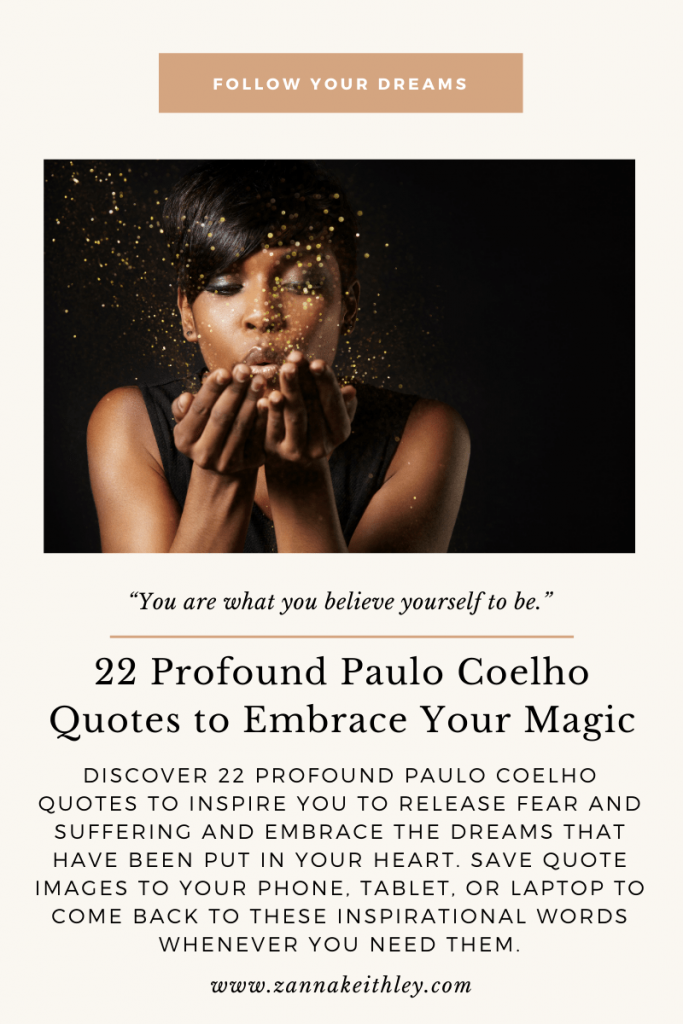
Pin this for later! 22 Profound Paulo Coelho Quotes (With Images) Paulo Coelho
Time and time again, whenever I’m feeling sad, lost, or misaligned, I find myself returning to Paulo Coelho‘s brilliant words, which always feel like a cool drink of water on a hot summer day.
The first time I heard his quote, “And, when you want something, all the universe conspires in helping you to achieve it,” I felt like the weight of the world was gently lifted off my shoulders. Immediately, I knew in my heart that these words were true: that the universe was always supporting me, even when I couldn’t see it.
And then there’s his quote, “Tell your heart that the fear of suffering is worse than the suffering itself. And no heart has ever suffered when it goes in search of its dream.”
These empowering words helped me to release my worries and anxiety about stepping into the life of my dreams. I realized that I was only suffering by holding myself back, but when I chose to align with the dreams that were placed in my heart, there was no more room for suffering.
There was only hope. Only passion. Only love.
And one that I’ve recently been coming back to over and over again is this: “You can become blind by seeing each day as a similar one. Each day is a different one, each day brings a miracle of its own. It’s just a matter of paying attention to this miracle.”
I love routine and order, and I tend to approach all of my days in the same way. And while there isn’t anything inherently wrong with this, I’ve realized that I can still open my eyes and choose to view each day as a miracle. That there’s always magic to be found if you simply decide to look for it.
All of these themes and more can be found in Coelho’s novel The Alchemist, a book I continually come back to and immerse myself in like a warm blanket on a cold day, filling me with light and warmth and hope.
Below, I’ve compiled 22 of my favorite Paulo Coelho quotes for inspiration, joy, hope, and following your dreams. I’ve also created images for each of these quotes, so feel free to choose your favorites and save them to your phone so you can come back to them whenever you need a little light in your day.
I hope these quotes bring you as much hope and inspiration as they’ve brought me.
Paulo Coelho Quotes

- “And, when you want something, all the universe conspires in helping you to achieve it.”

2. “When we love, we always strive to become better than we are. When we strive to become better than we are, everything around us becomes better too.”

3. “You drown not by falling into a river, but by staying submerged in it.”

4. “There is only one thing that makes a dream impossible to achieve: the fear of failure.”

5. “The secret of life, though, is to fall seven times and to get up eight times.”

6. “One is loved because one is loved. No reason is needed for loving.”

7. “One day you will wake up and there won’t be any more time to do the things you’ve always wanted. Do it now.”

8. “Everybody has a creative potential and from the moment you can express this creative potential, you can start changing the world.”

9. “The simple things are also the most extraordinary things, and only the wise can see them.”

10. “If you want to be successful, you must respect one rule – Never lie to yourself.”

11. “People are capable at any time in their lives, of doing what they dream of.”

12. “Tell your heart that the fear of suffering is worse than the suffering itself. And no heart has ever suffered when it goes in search of its dream.”

13. “You can become blind by seeing each day as a similar one. Each day is a different one, each day brings a miracle of its own. It’s just a matter of paying attention to this miracle.”

14. “You are what you believe yourself to be.”

15. “You will never be able to escape from your heart. So it is better to listen to what it has to say.”

16. “Remember that wherever your heart is, there you will find your treasure.”

17. “The two worst strategic mistakes to make are acting prematurely and letting an opportunity slip; to avoid this, the warrior treats each situation as if it were unique and never resorts to formulae, recipes or other people’s opinions.”

18. “We can never judge the lives of others, because each person knows only their own pain and renunciation. It’s one thing to feel that you are on the right path, but it’s another to think that yours is the only path.”

19. “No matter what he does, every person on earth plays a central role in the history of the world. And normally he doesn’t know it.”

20. “A child can teach an adult three things: to be happy for no reason, to always be busy with something, and to know how to demand with all his might that which he desires.”

21. “The act of discovering who we are will force us to accept that we can go further than we think.”

22. “I can choose either to be a victim of the world or an adventurer in search of treasure. It’s all a question of how I view my life.”
What quotes inspire you to live your boldest, most authentic life? Share your favorites in the comment box below!
And for more resources on spirituality, meditation, manifestation, and all things self-love, be sure to connect with me on Instagram and Pinterest, where I’m posting positive affirmations and empowering messages daily.
More Articles You May Like
- 50 Inspiring Journal Prompts for Self-Discovery
- How To Use Affirmation Cards (A Complete Guide)
- Vision Board Ideas To Visualize Your Ideal Future (With Examples)
- 8 Powerful Guided Meditations For Manifesting Your Dreams
- 11 Beautiful Poetry Books About Self-Love & Acceptance
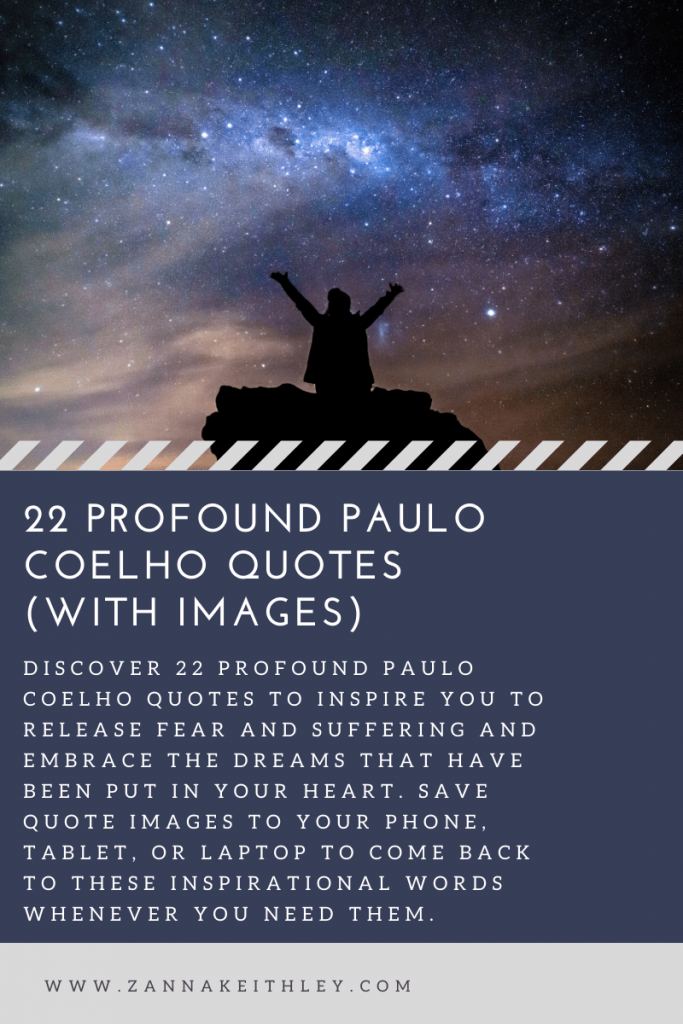
Pin this for later! 22 Profound Paulo Coelho Quotes (With Images) 
Zanna Keithley is an author, poet, and social media content creator who writes short prose dedicated to inspiring readers to follow their dreams, trust their intuition, and create beautiful and fulfilling lives. You can find her original writing on Instagram @zannakeithley.
-
50 Inspiring Journal Prompts for Self-Discovery
In this article, you’ll find 50 inspiring journal prompts for self-discovery and personal growth. Plus, I share some of my favorite guided journals for connecting with your truest, most authentic self.
Disclaimer: This post contains Amazon links. As an Amazon associate, I earn from qualifying purchases. If you purchase a product using my link, I may receive a small commission at no extra cost to you. You can read my full disclosure policy here.
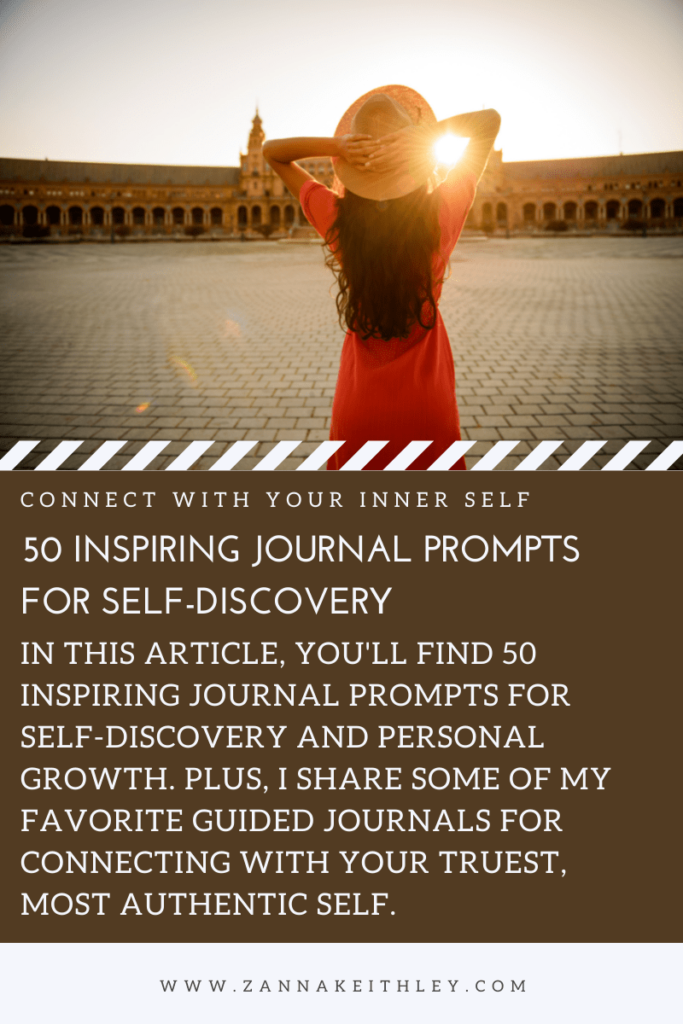
Pin this for later! 50 Inspiring Journal Prompts For Self-Discovery Journaling For Self-Discovery
Journaling is a powerful tool in your journey of self-discovery, personal growth, and creating the life that you truly love.
For the past several years, I’ve been journaling for 30 minutes every morning as soon as I wake up. I do this even before eating breakfast, working out, checking social media, or meditating.
This practice has served me in more ways than I ever could’ve imagined. I’ve found that when I take 30 minutes to focus solely on my inner world, I forge a deeper connection with my most authentic self.
Additionally, it helps me to get any thoughts, worries, or heavy emotions out of my body and onto the blank page in front of me. By the end of my journaling sessions, I always feel lighter and more clear-headed as I set out to embrace the opportunities and experiences of the new day ahead.
Your own journaling practice should be tailored to your unique preferences and needs. You might journal for ten minutes a day or a whole hour. You might like early mornings, or maybe you like to journal at night to help you unwind from your day.
There are no rules to journaling; do what feels best to you.
If I can give you one piece of advice, though, it would be to make your journaling practice a safe place from self-judgment or self-criticism.
This means you’re free to write down whatever you need to without your inner critic telling you it’s wrong to think or feel a certain way.
In fact, if you’re seeking meaningful self-discovery, the best thing you can do is to get curious.
For instance, let’s say you’re journaling about the day you had yesterday, and you realize you didn’t react to a situation as well as you would’ve liked to. Instead of criticizing yourself, allow yourself to explore your reaction with non-judgmental awareness.
Keep probing deeper to get to the root of your own thoughts, actions, feelings, and beliefs.
Below, you’ll find 50 journal prompts for self-discovery, personal growth, and exploring your inner self. You can choose to spend as much or as little time on each prompt as you’d like, and you can also skip around to complete them in any order you’d prefer.
And be sure to keep scrolling to the end of the post, where I link to seven of my favorite guided journals for self-discovery. Though each journal is uniquely different, each one will powerfully guide you in your personal growth journey and give you everything you need to explore your own inner world.
- You May Also Like: How To Love Yourself More Each Day (8 Profound Practices)
Journal Prompts for Self-Discovery
- What would I do today if I knew I could not fail?
- What’s still worth doing, even if I do fail?
- What does my perfect, dream life look like?
- What limiting beliefs or fears are holding me back from pursuing my dreams?
- What are some of my favorite qualities about myself?
- What superpower do I have that makes a positive difference in other people’s lives?
- How have I grown in the past year? What led me to experiencing this type of growth?
- How have I grown in the past ten years? What positive changes am I most grateful for?
- What are some obstacles and challenges I’ve experienced that I now feel grateful for, even if it was hard to appreciate it at the time?
- What risks have I taken in my life that I’m really glad I took?
- What risks do I want to take this year, and what’s holding me back?
- What does self-care mean to me? What are some of my favorite self-care activities? How can I incorporate more self-care into my life?
- How do I express my creativity? What are my favorite creative activities? How can I make space for more creative outlets in my life?
- How do I use my imagination now compared to when I was a child? Do I still use my imagination in my daily life? How can I embrace using my imagination more?
- Do I let myself experience fun and play in my daily life? How can I make space for more play? What are some of my favorite fun activities?
- What are my guiding principles and truths? How do I live by my guiding principles in my daily life?
- How can I be kinder and more compassionate to myself? When my inner bully comes out, what can I do to show myself more kindness and love?
- In what situations do I hold back from speaking my truth? Are there any situations in which I withdraw, even when I have something to say? What can I do to feel more confident in these situations?
- What are some of the people, experiences, and/or things in my life that I sometimes take for granted? How can I cultivate more gratitude and appreciation in my daily life?
- What does it mean to me to be stable, secure, and grounded? When I’m feeling off-balance, what can I do to help myself feel more grounded and centered?
- When do I feel happiest? What brings me true joy?
- What do I need more of in my life? How can I bring more of this into my world?
- What do I need to release in my life? How can I let go of these things/experiences/people/beliefs to make space for something new?
- What does success mean to me? How might my idea of success be different from someone else’s idea of success?
- How do I nourish my mind? What can I do for myself to support a strong, healthy mind?
- How do I nourish my body? What can I do for myself to support a strong, healthy body?
- How do I nourish my soul? What can I do for myself to support a strong, healthy soul?
- What tasks do I tend to avoid doing? Why do I avoid these tasks? How can I support myself in approaching these tasks with confidence?
- What’s my favorite compliment I’ve ever received? Why did the compliment mean so much to me?
- What is one thing I can do today to lovingly nurture my mind, body, and spirit?
- What is one thing I can do today to bring me closer to my dreams?
- What is one thing I can do today to support my personal growth journey?
- Do I have any unhealthy habits? What steps can I take to release my unhealthy habits and create new, more positive ones?
- What does my comfort zone look like? In what ways does this comfort zone support me, and in what ways does it hinder my growth? How can I begin to step outside of my comfort zone over the next few months?
- How would I describe myself to a total stranger if I knew they wouldn’t judge me?
- How would my friends and family describe me?
- What are some hardships I’ve experienced, and in what ways have these hardships helped me to grow?
- What does a perfect day look like to me?
- What’s one thing I can do in five minutes a day to support myself?
- What’s something I’ve always dreamed of doing but haven’t done yet? Can I make this dream come true this year?
- What’s on my lifelong bucket list? Which of these things could I do or accomplish over the next year?
- What kind of person do I want to be? How do I want to be remembered?
- In the middle of a busy and/or stressful day, what can I do to help myself feel supported and centered?
- What types of situations and experiences make me feel tense and/or withdrawn? What can I do to help myself in these situations?
- What was one of my absolute favorite childhood moments? What did I love most about that moment? (Describe the moment in detail.)
- In what ways did my childhood shape the person I am now?
- What aspects of my childhood am I most grateful for?
- If I could go back in time and tell my younger self anything, what would I say?
- What are ten things about my body that I truly love and feel grateful for?
- What are all the aspects of my life right now, exactly as it is, that I feel true gratitude and appreciation for?
Guided Journals
True You: A Self Discovery Journal
The beautifully illustrated True You: A Self-Discovery Journal is filled with incredibly powerful journal prompts divided into categories like Self-Awareness, Values, Identity, and Confidence. It’s also filled with inspirational quotes and creative exercises, and did I mention that it’s absolutely gorgeous? (This journal is one of my favorites!)
Soul Therapy: A 365 Day Journal for Self Exploration, Healing & Reflection
The Soul Therapy Journal is a powerful daily guided journal filled with thought-provoking prompts, quotes, reflection questions, daily practices, and an endless amount of truly nourishing food for your soul.
This Year I Will: . . . A 52-Week Guided Journal to Achieve Your Goals
This 52-Week Guided Journal is the perfect guide to exploring your goals, setting intentions, practicing gratitude, and growing over the course of the next 365 days.
Burn After Writing
Burn After Writing is the guided journal that encourages you to spend less time scrolling and more time reflecting. It’s filled with powerful prompts to reflect upon and explore your past, present, and future.
Gratitude: A Day and Night Journal
I love the Gratitude: A Day and Night Journal because it allows you to reflect daily on your thoughts, intentions, goals, and what you’re truly grateful for in your life. This is the perfect journal for cultivating a sense of gratitude, optimism, and true joy each and every day.
Start Where You Are: A Journal for Self-Exploration
There are so many things to love about the Start Where You Are Journal: it’s beautifully illustrated, contains lots of inspiring journal prompts and quotes, and it nurtures your creativity by allowing space to draw and color on many of the pages. This is the perfect journal for exploring your inner self while also embracing your divine creativity.
Present, Not Perfect: A Journal for Slowing Down, Letting Go, and Loving Who You Are
Last but definitely not least, the Present, Not Perfect Journal is another gorgeously illustrated guided journal to gently guide you to release the stress and overwhelm of your daily life and make space for mindfulness, introspection, and total self-love.
How do you approach your journaling practice? Share your tips and experiences in the comment box below!
And for more resources on spirituality, meditation, manifestation, and all things self-love, be sure to connect with me on Instagram and Pinterest, where I’m posting positive affirmations and empowering messages daily.
More Articles You May Like
- How To Use Affirmation Cards (A Complete Guide)
- Vision Board Ideas To Visualize Your Ideal Future (With Examples)
- 8 Powerful Guided Meditations For Manifesting Your Dreams
- 30 Journal Prompts For Self Growth (& Deeper Self-Love)
- 11 Beautiful Poetry Books About Self-Love & Acceptance
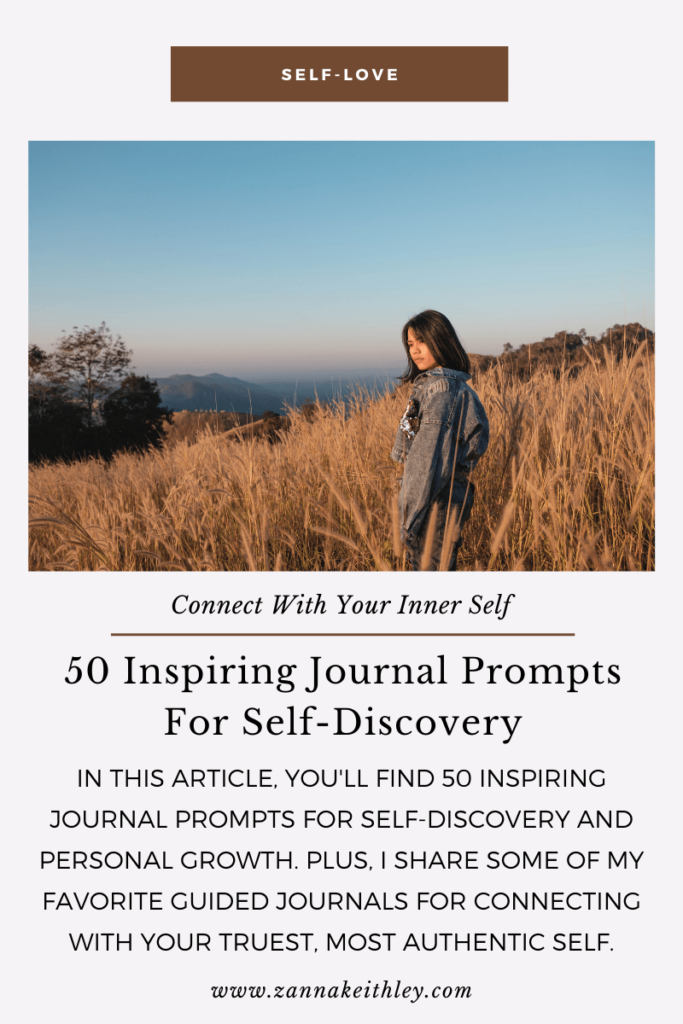
Pin this for later! 50 Inspiring Journal Prompts For Self-Discovery 
Zanna Keithley is an author, poet, and social media content creator who writes short prose dedicated to inspiring readers to follow their dreams, trust their intuition, and create beautiful and fulfilling lives. You can find her original writing on Instagram @zannakeithley.
-
What is the Art of Allowing? (A Complete Guide)
In this post, discover the meaning of the Art of Allowing, plus get tips and journal prompts to help you surrender your worries and trust the Universe to guide you in the direction of your dreams and desires.
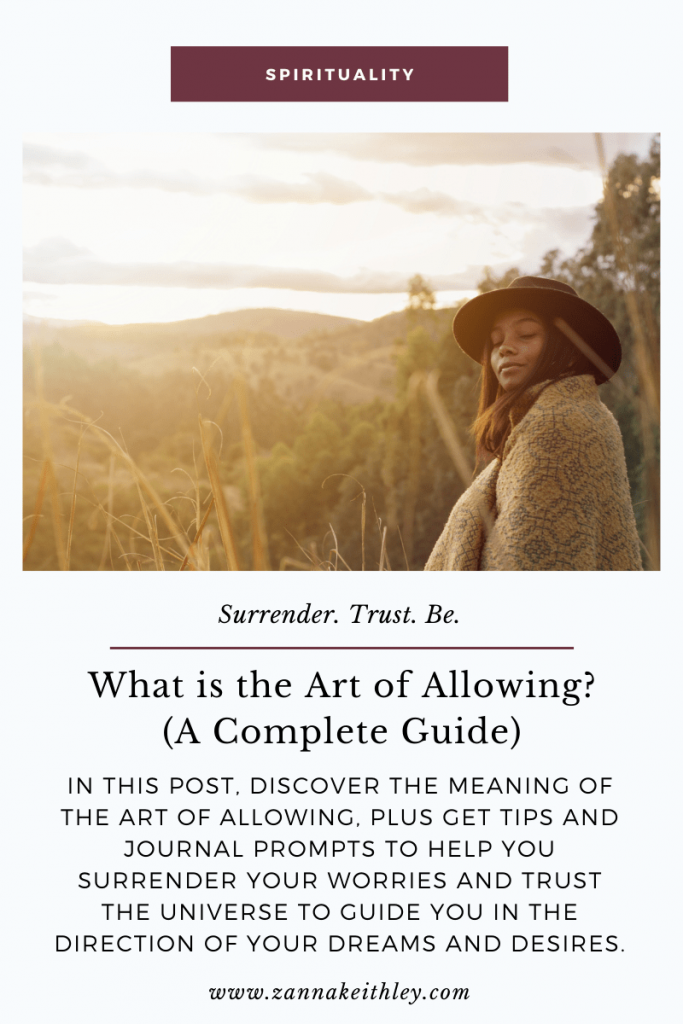
Pin this for later! What is the Art of Allowing? (A Complete Guide) What is the Art of Allowing?
The Art of Allowing is a key component in manifestation, which is the practice of visualizing your dreams and desires and vibrating at the frequency of your desires as if they’ve already come true. By becoming the embodiment of all your deepest desires, you attract more of this positive energy to you. (For instance, when you allow yourself to feel truly loved and cherished right now, you attract even more love into your life.)
Generally, when you read or listen to someone speak about manifestation, it’s in a very active sense. The word “manifest” itself is an action word. It seems to require continually doing. You visualize your desires, set an intention, listen to your intuition, take inspired action, and continually cultivate more and more self-belief.
But this only tells half the story. Manifestation isn’t only about doing; it’s also about being.
Or, rather, allowing.
According to Abraham Hicks, the Art of Allowing is “the conscious, gentle guiding of your thoughts in the general direction of the things that you desire.”
To demonstrate this, imagine that you’re on a boat floating down a river. When you’re effortlessly floating downstream, you’re moving in the flow of all your dreams and desires. You might set aside your paddles, lay down, and let the Universe carry you, trusting that it’s taking you exactly where you want to go.
It seems simple enough, but often, we do the exact opposite: we pick up the oars and start furiously trying to paddle upstream, convinced we know the right path. Not only does this take us in the opposite direction of our desires, but it causes us to exert a lot more energy (and most of it isn’t positive).
The Art of Allowing is the practice of moving in flow with the Universe. It’s understanding that manifestation and the Law of Attraction isn’t 100% doing all the time. When you’re in alignment with the universal flow, you realize that your most important work of all is to feel good. You’re able to let go of control and surrender your path to the Universe. You focus on cultivating such a beautiful world within, your positive energy spreads outside of you.
This is the Art of Allowing: to let the positive energy of all your dreams and desires become the center of your world. You leave the when, what, where, and how to the Universe and focus solely on cultivating positive thoughts and positive emotions that support your entire well-being.
When you’re able to do this consistently each day, something kind of magical will begin to unfold in your outer world.
Want to learn how to practice the Art of Allowing? Keep reading to learn how to know if you’re moving with the flow of the Universe and how to cultivate a mindset of allowing.
- You May Also Like: 44 Abraham Hicks Affirmations for Love, Joy & Manifestation
How to Know If You’re Allowing
Have you ever had a moment where you feel really good about the path you’re on but then inner worries start to kick in? Maybe you think it’s too good to be true. Or maybe you start to think that you’re not truly worthy of your dreams. Many of us unintentionally self-sabotage, believing that it’s just not possible for good things to happen to us.
Something has to go wrong, right?
I’ve experienced this many times in my own journey. I’ll experience success and feel really good about my success . . . and then soon after, my inner worries and insecurities start to kick in. Here are some common thoughts I’ve had when this happens:
- Am I really worthy of all these good things?
- Something bad has to happen, right?
- I shouldn’t be so confident. As soon as I’m too confident, the Universe will knock me back down again.
Have you ever had these types of thoughts? These negative thoughts are essentially our way of sabotaging ourselves from allowing more good things to flow in.
It’s not just our own internal fears and limiting beliefs that stop us from allowing, though. When we let external situations influence our internal worlds, we also block ourselves from receiving what we desire.
For instance, someone cuts you off in traffic. Or someone is rude to you at the grocery store. Maybe your boss was a jerk today or your partner’s bad mood has started to affect your own.
When you let these external situations stir up negative feelings such as anger and frustration within, you’re only causing yourself to suffer in the long run. Your power lies in your ability to experience a range of negative external situations but to not let them influence your own emotional state.
How to Practice the Art of Allowing
In theory, it seems like practicing the Art of Allowing should be really easy. It simply requires you to allow in the things you really want in your life. And to do that, the first step is to feel all of the things you already want to feel in your life: joyful, peaceful, free, abundant, loved.
All of it sounds simple enough.
But the truth is, this practice isn’t always easy. Especially not at first. There’s a good chance that you have decades of lived experience that directly counteracts the Art of Allowing.
So that’s why I want to start with this:
If you notice yourself having trouble releasing your worries and simply allowing, don’t criticize yourself. Don’t judge or condemn yourself.
One affirmation that I really like in these moments is, “I’m doing the best I can, and my best is enough.”
To help make the Art of Allowing a little easier, here are some practices you can utilize in your daily life:
Connect With Your Inner Self
The first step to practicing the Art of Allowing is to understand your own relationship with allowing in your daily life. Do you easily allow things in, or do you always have to be in control of every situation? Do you trust the Universe to support you? How much time do you spend doing versus time spent being?
Once you understand your own relationship with allowing, you’re better able to begin surrendering control. While you can internally reflect upon the questions I posed above, I always find journaling to be a profound practice when I need to connect with my deepest self. To start, find a quiet spot where you won’t be interrupted. See if you can dedicate at least 15 to 20 minutes to this practice. As you journal, enact a “no self-criticism” rule. This means that even if uncomfortable truths arise, you don’t judge yourself for what you uncover.
Rather, acknowledge your truths with love and compassion. Remember that this journey of personal growth isn’t easy, and give yourself some credit for the courage it takes to go on this journey. If you’re not happy with the way you’ve reacted to situations in the past, you can recognize this while also asserting that you’re ready to start telling a new story now.
Below, you’ll find some journal prompts to help you uncover your own relationship with the Art of Allowing.
Journal Prompts for the Art of Allowing
- Do I trust my path or do I have a hard time releasing control? What makes this hard or easy for me?
- What does it mean to me to surrender to a higher power? Is this easy or hard for me?
- What are three ways I can practice surrendering in my daily life?
- What evidence do I see in my life that the Universe is always looking out for me? What are some visible and non-visible signs of the Universe’s love?
- How can I use this evidence to cultivate more trust and allowing?
- When it comes to my big goals and dreams, how much time do I spend doing? How much do I practice simply allowing?
- What does allowing mean to me?
- How does allowing feel to me?
- Describe a day as your highest, most authentic self walking through life simply allowing. What does this day look like?
Use Positive Affirmations
Positive affirmations are present-tense statements that are designed to uplift and encourage while boosting self-belief and supporting your overall well-being. Most positive affirmations support the practice of allowing, as they help to align you with the feel-good state of your dreams and desires. Depending on the situation, you can use specific affirmations that will help you in the moment. For instance, if you’re experiencing anxiety, you can repeat some gentle affirmations for anxiety.
To learn more about how to use positive affirmations to get the most out of them, I encourage you to read my blog post, How to Use Affirmations (So They Actually Work).
Below, I’ve linked to a few blog posts that will help to lift your vibrations and align you with the feelings of faith, joy, and inner peace:
- 40 Positive Affirmations for Faith, Hope, and Trust
- 45 Positive Affirmations for Happiness and True Joy
- 40 Gratitude Affirmations to Love This Moment Right Now
- 35 Beautiful Affirmations for Peace and Serenity
- 35 Calming Affirmations to Release Your Worries
Meditate
Whenever you feel misaligned, meditation is a powerful practice for gently guiding you back home to yourself. It allows you to let go, surrender control, and open yourself up to receive whatever is for your highest good. Meditation is truly the ultimate practice for being and allowing.
Consider this quote from Abraham Hicks:
- “By deliberately focusing upon good-feeling thoughts, you allow your physical cells to return to their natural balance. Breathing deeply is the key, softly hearing our words and allowing gentle alignment with the Energy of your Source.”
And this one:
- “There is no better way of stopping the momentum of something unwanted, and to allow the momentum of something wanted, than to meditate – other than getting a full night’s sleep.”
If you’re new to meditating, Mindful has a great meditation guide for beginners. I also encourage you to check out the InsightTimer app, which is my personal go-to app for meditation.
Align With Your Highest Self
Your highest self is your essential self; it’s the eternal part of you that’s untouched by human experiences. This is the truest, most authentic part of you.
When you think about the Art of Allowing, consider how your highest self would respond to various situations. How does your highest self approach your goals and dreams? Does your highest self trust your path? How does your highest self respond in the face of not knowing what’s going to happen next?
It takes practice, but intentionally choosing to align with your highest self is one of the most powerful practices you can do to allow your deepest desires to manifest in your life. (And if you stray from your highest self? That’s okay. Don’t criticize or judge yourself. Respond with love and compassion, and remember that in every moment, you have the opportunity to realign with the true you.)
Below are some questions to consider when thinking about your highest self. You can answer these questions internally or reflect upon them in your journal.
- Who is my highest self? How do I align with my highest self in my daily life?
- Is my highest self able to trust, allow, and just be?
- How does my highest self approach each day? How does my highest self react to negative energy? How does my highest self walk through life?
- Do I regularly consult with my highest self when responding to situations and making decisions? If not, how can I begin to include my highest self in my life’s journey?
- When I’m aligned with my highest self, how do I feel?
Abraham Hicks Quotes on the Art of Allowing
- “The Art of Allowing, is wanting so much to feel good, that whether you are perusing the past or the present, or the future, you’re deliberately looking for the best-feeling thought that you can find.”
- “The Art of Allowing says, ‘I’ve created it. It’s coming to me. It wants me. I want it. I will find a path to allow it. And the path of allowing what I want is the path of happiness, and joy, and feeling good.'”
- “No matter what it is, if you really want it, and if you get out of the way of it, it will happen. It must be. It is Law. It can be no other way. It’s the way this Universe is established. If you want it and you relax, it will happen.”
- “The Art of Allowing is caring so much about how I feel that I am unwilling to go to those uncomfortable places like: defending, justifying, rationalizing or trying to figure out why.”
One Final Note
One last aspect about the Art of Allowing that’s important to mention is that this practice also means allowing others to live their lives without trying to control them. You may think you know the best path for them, but you can’t force anything on another person. They must discover their own path, which may be drastically different from what you want for them.
You can be a beacon of love and compassion. You can be a guiding light when they ask for advice. You can be a positive example of what it means to walk your own path in love and faith.
But you can’t push them in a certain direction.
The Art of Allowing means giving others the freedom to follow their own inner knowing, learn from their own experiences, and grow at their own pace.
And truly, when you’re aligned with the flow of the Universe, you won’t want this anyway. Once you fully allow, there is no need to control. You’ll be able to let go and trust that the Universe is taking care of the highest good for yourself and others.
For uplifting affirmations and inspiring messages, be sure to connect with me on Instagram, where I post daily affirmation stories every morning. And don’t forget to follow me on Pinterest, where I’m pinning positive affirmations and empowering quotes every single day.
And if you’re looking for more manifestation resources, be sure to check out the Dreams, Goals & Manifestation Printables and The Ultimate Manifestation Workbook, available now in my online shop.
More Articles You May Like
- How to Manifest Something: 10 Essential Manifestation Methods
- Manifestation Challenge: Free 30-Day Calendar
- 50 Abundance Affirmations to Create a Limitless Life
- 65 Positive Affirmations for Manifestation
- 30 Inspiring Vision Board Quotes (With Images to Save & Share)
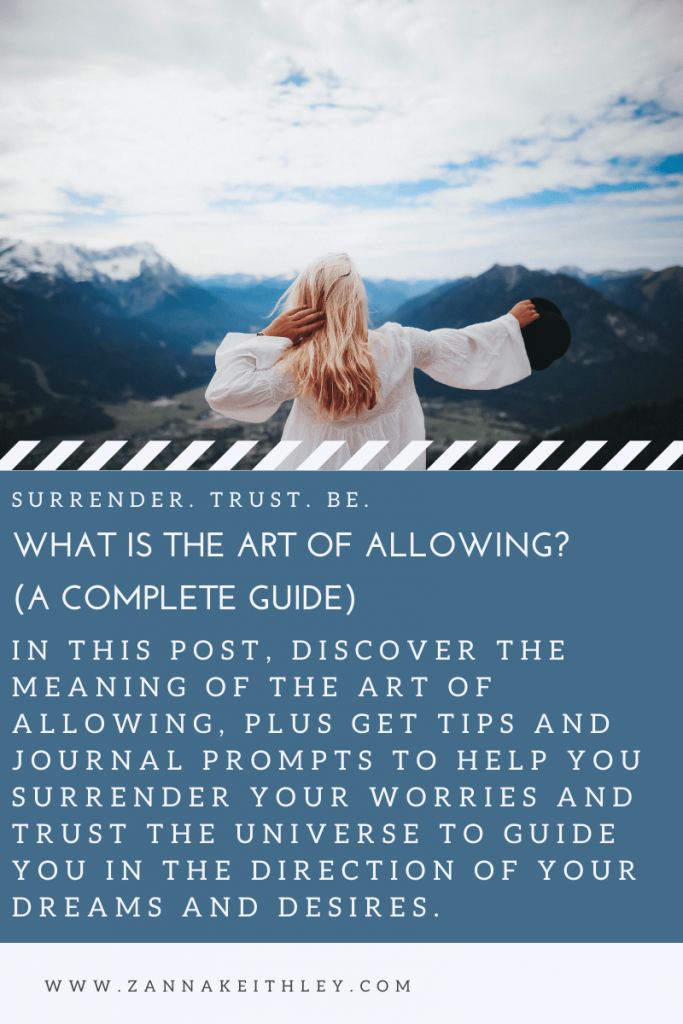
Pin this for later! What is the Art of Allowing? (A Complete Guide) 
Zanna Keithley is an author, poet, and social media content creator who writes short prose dedicated to inspiring readers to follow their dreams, trust their intuition, and create beautiful and fulfilling lives. You can find her original writing on Instagram @zannakeithley.
